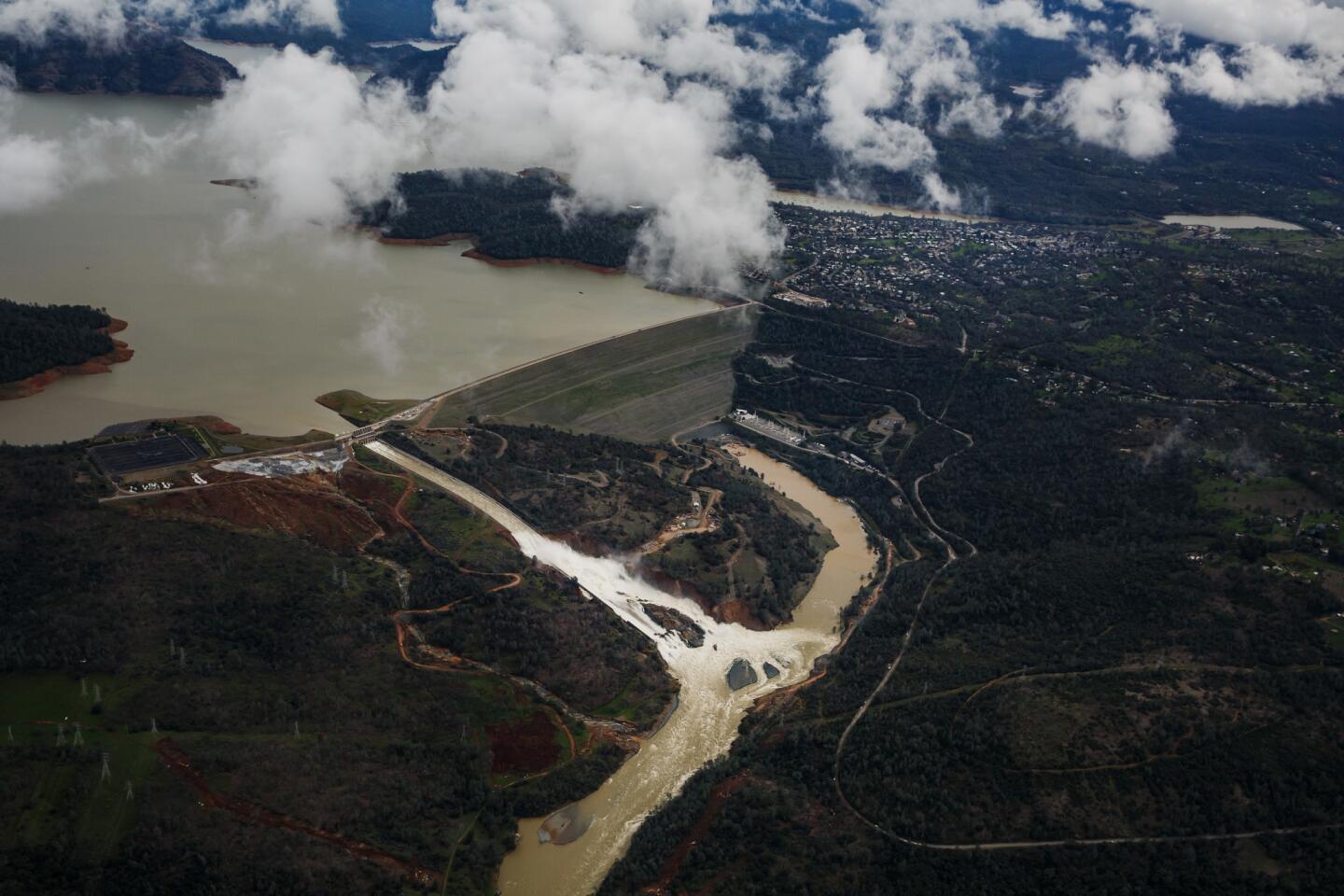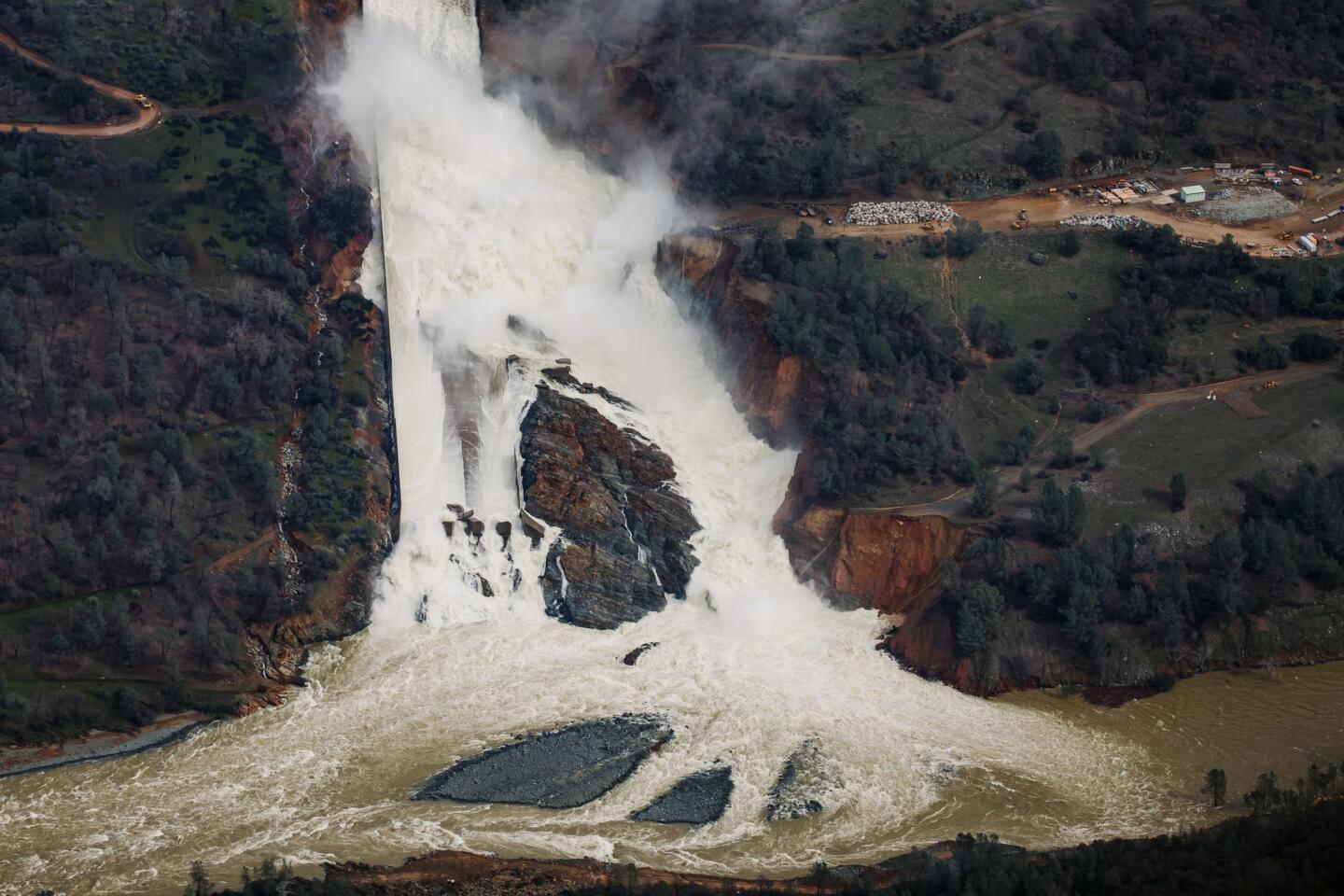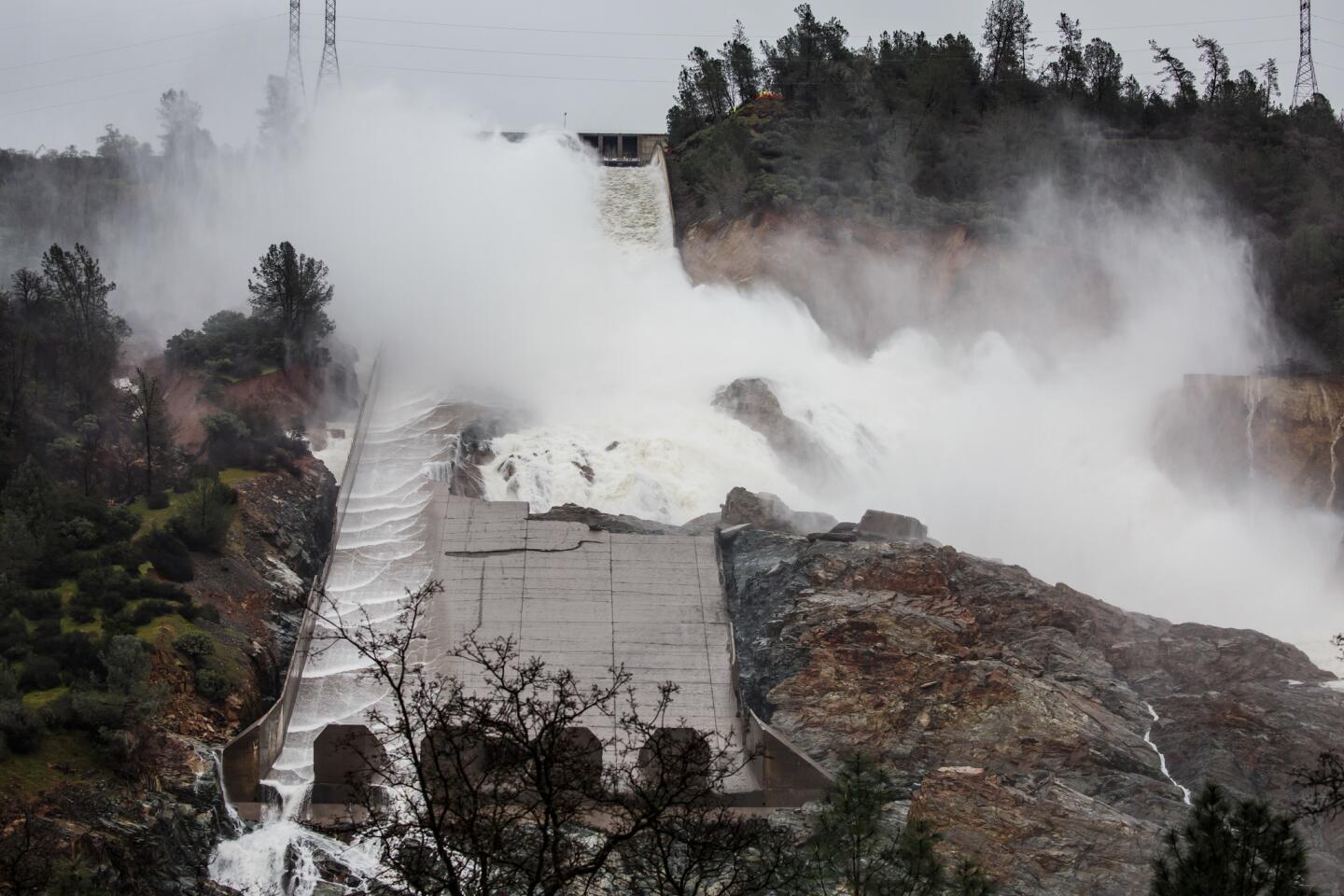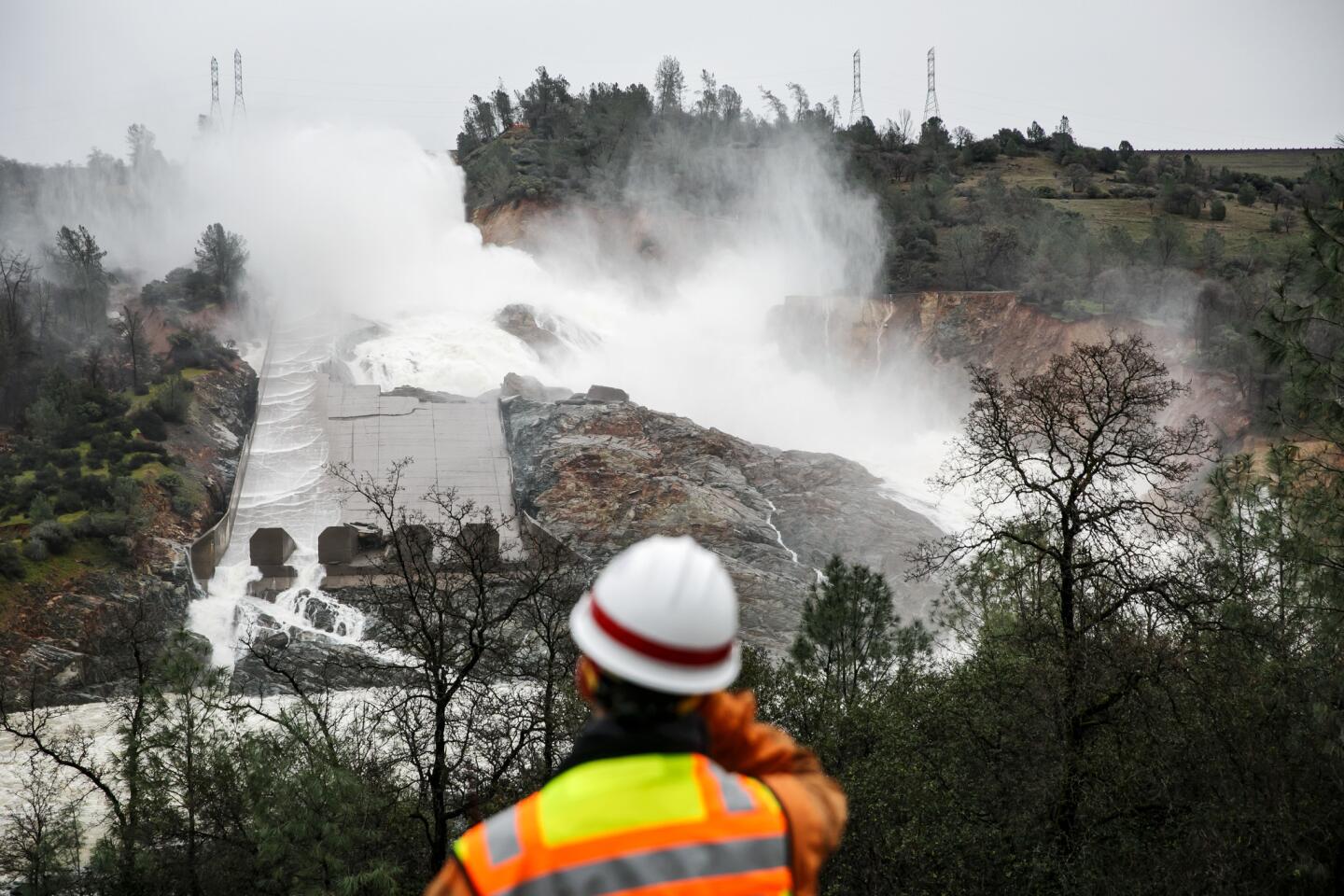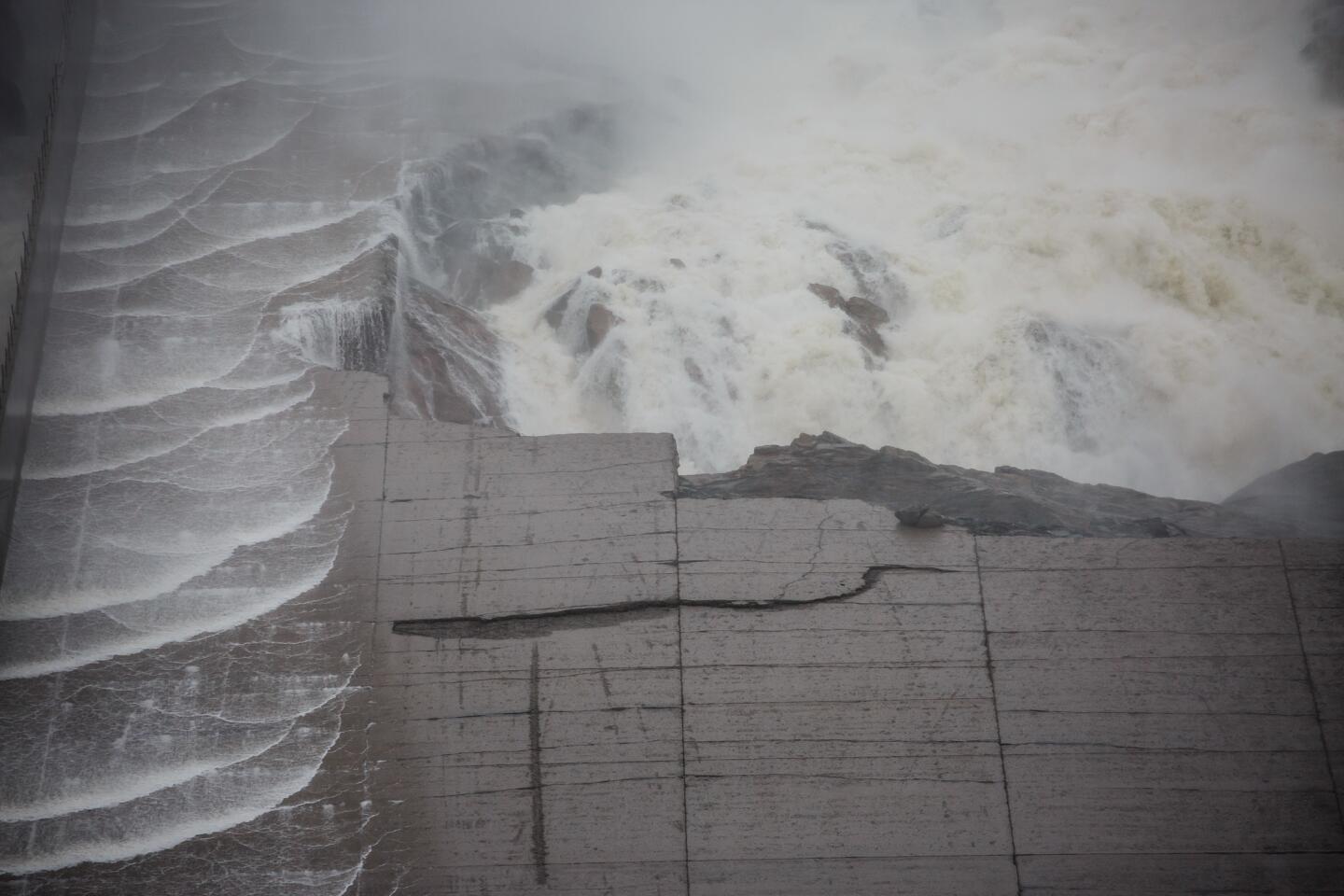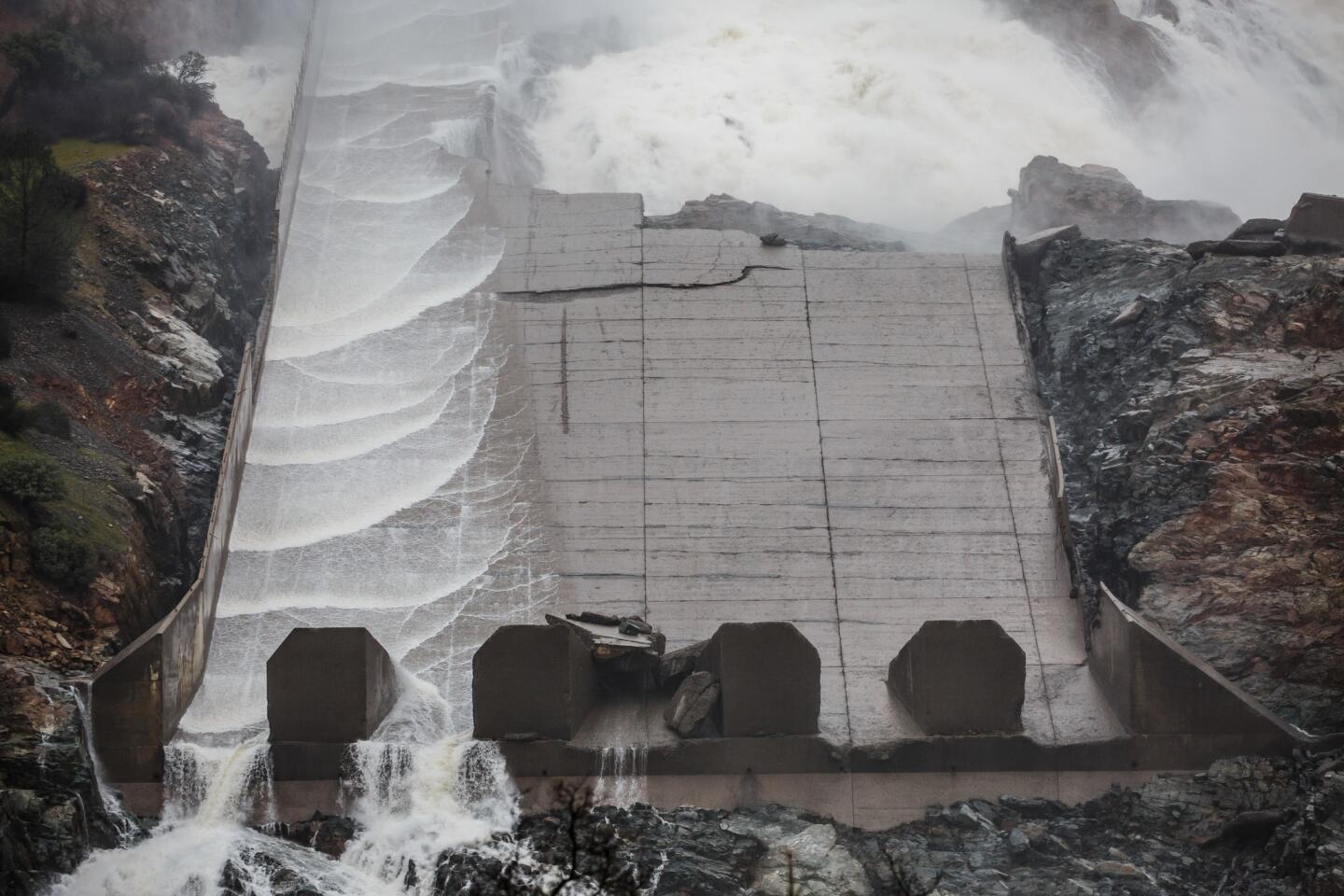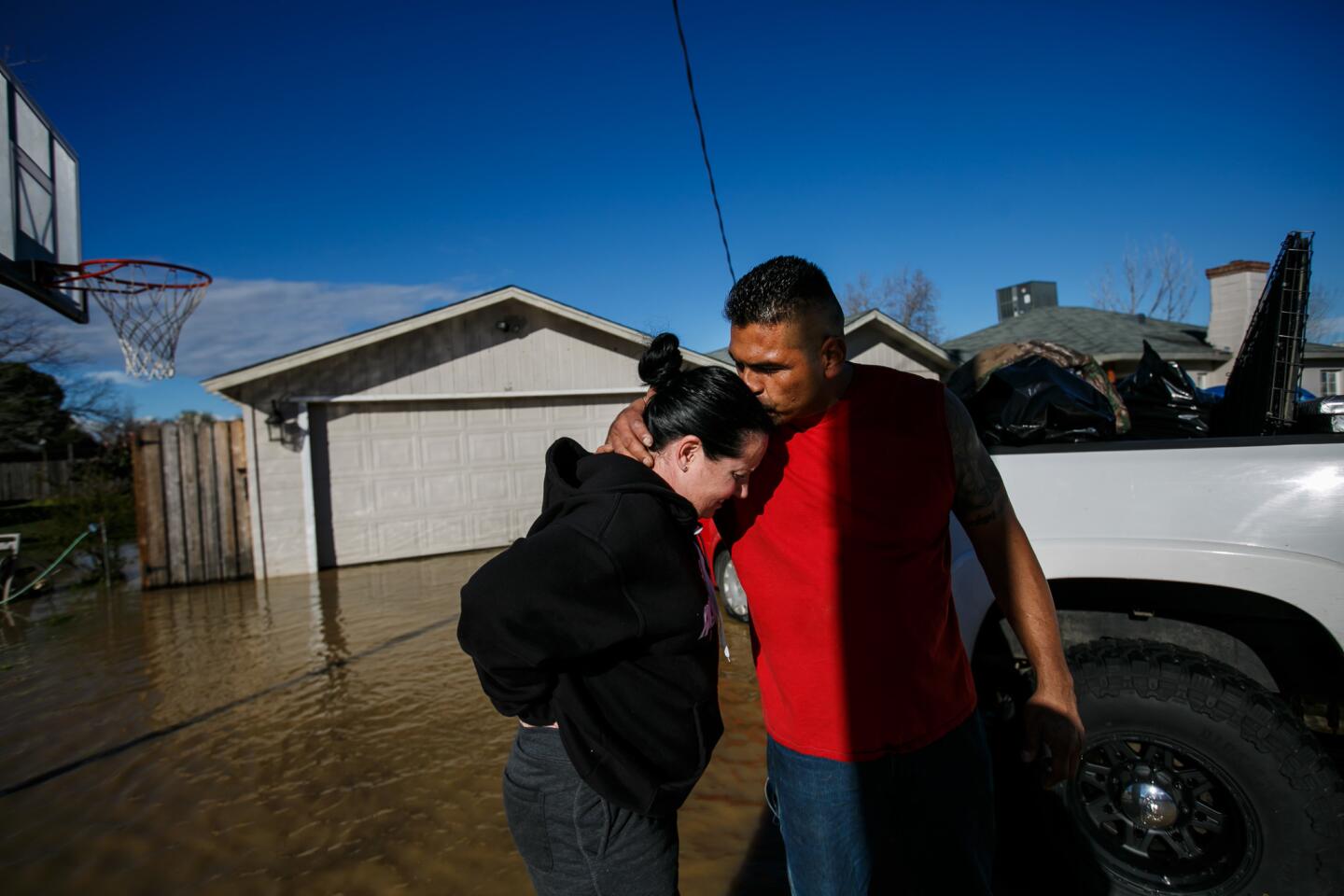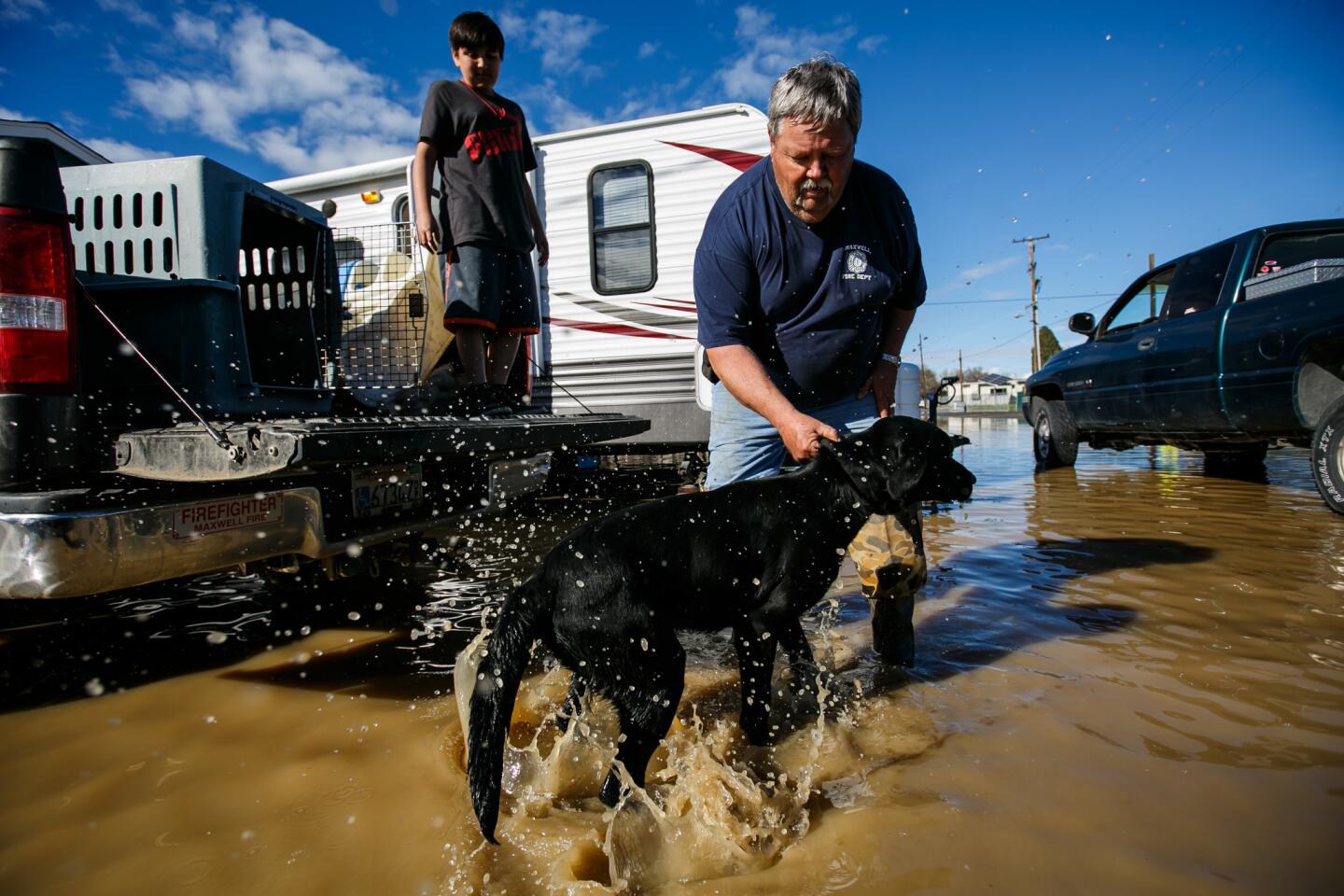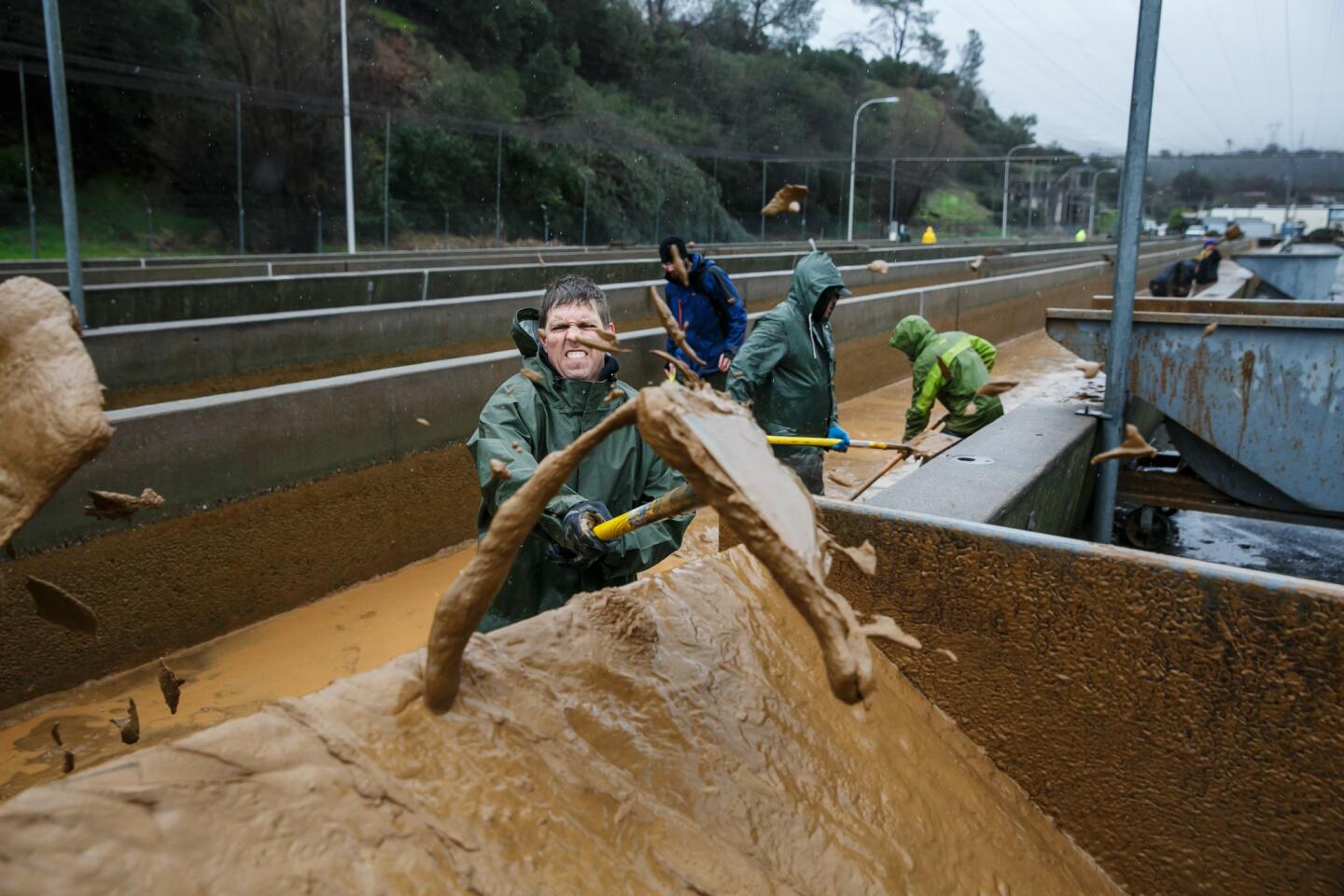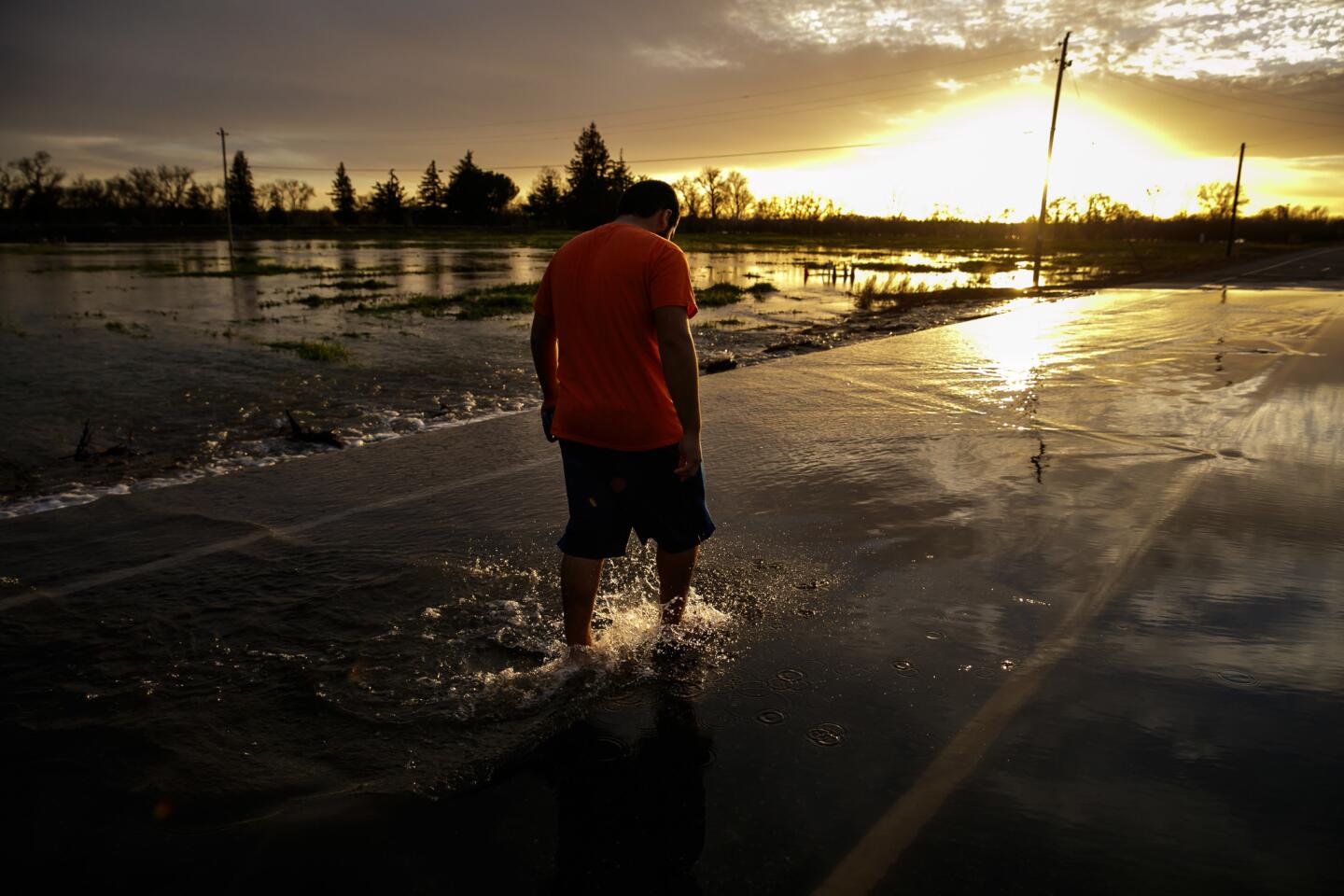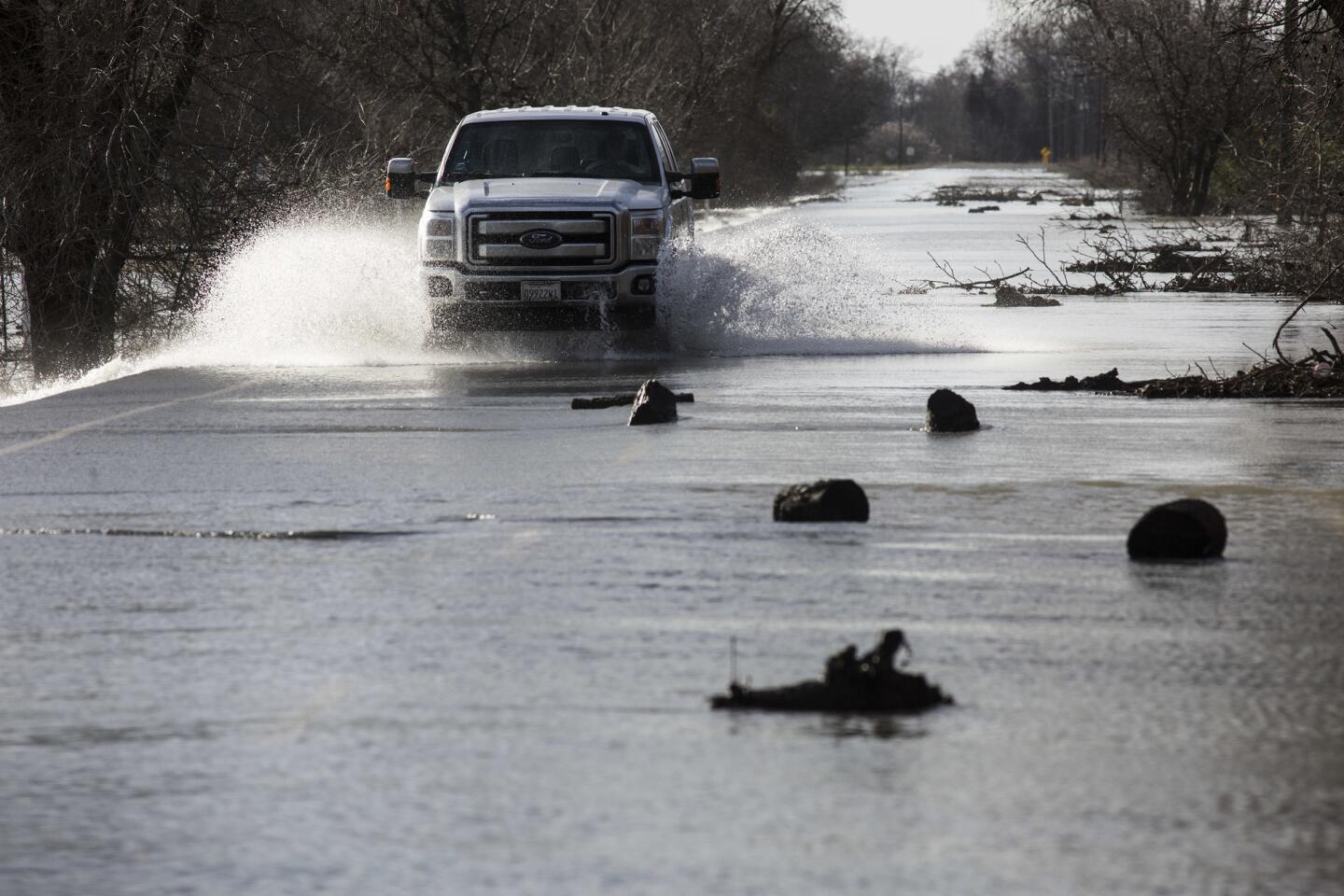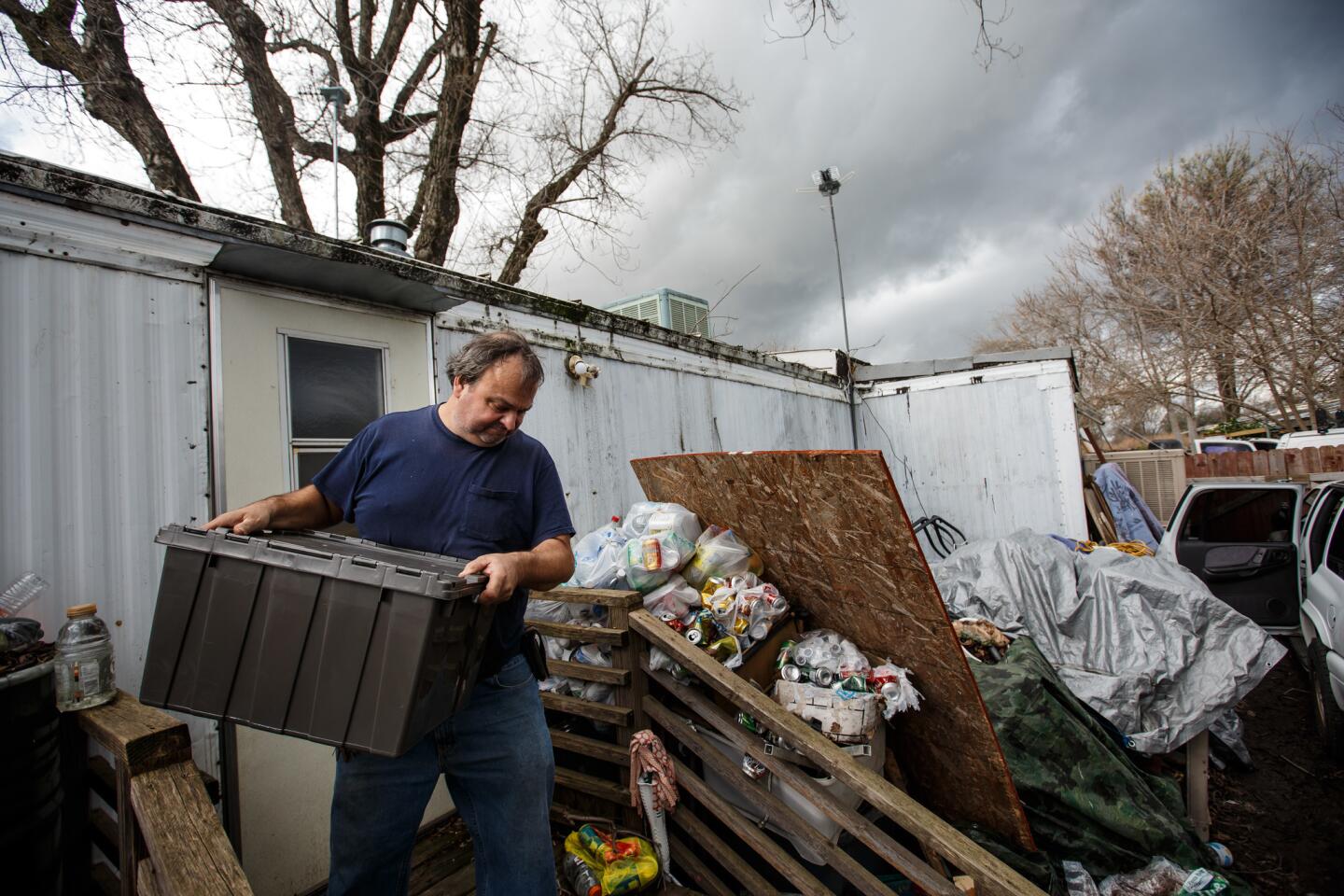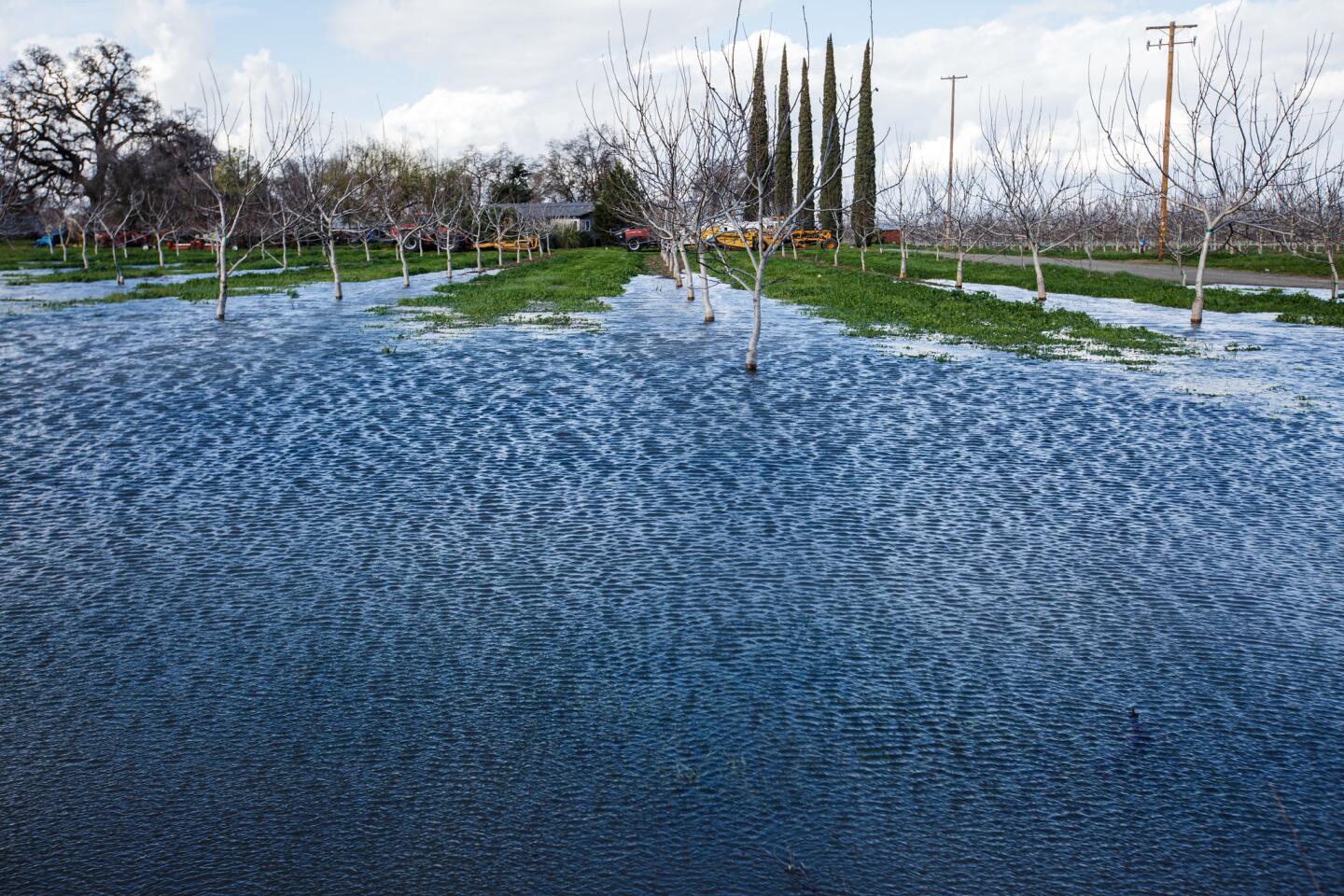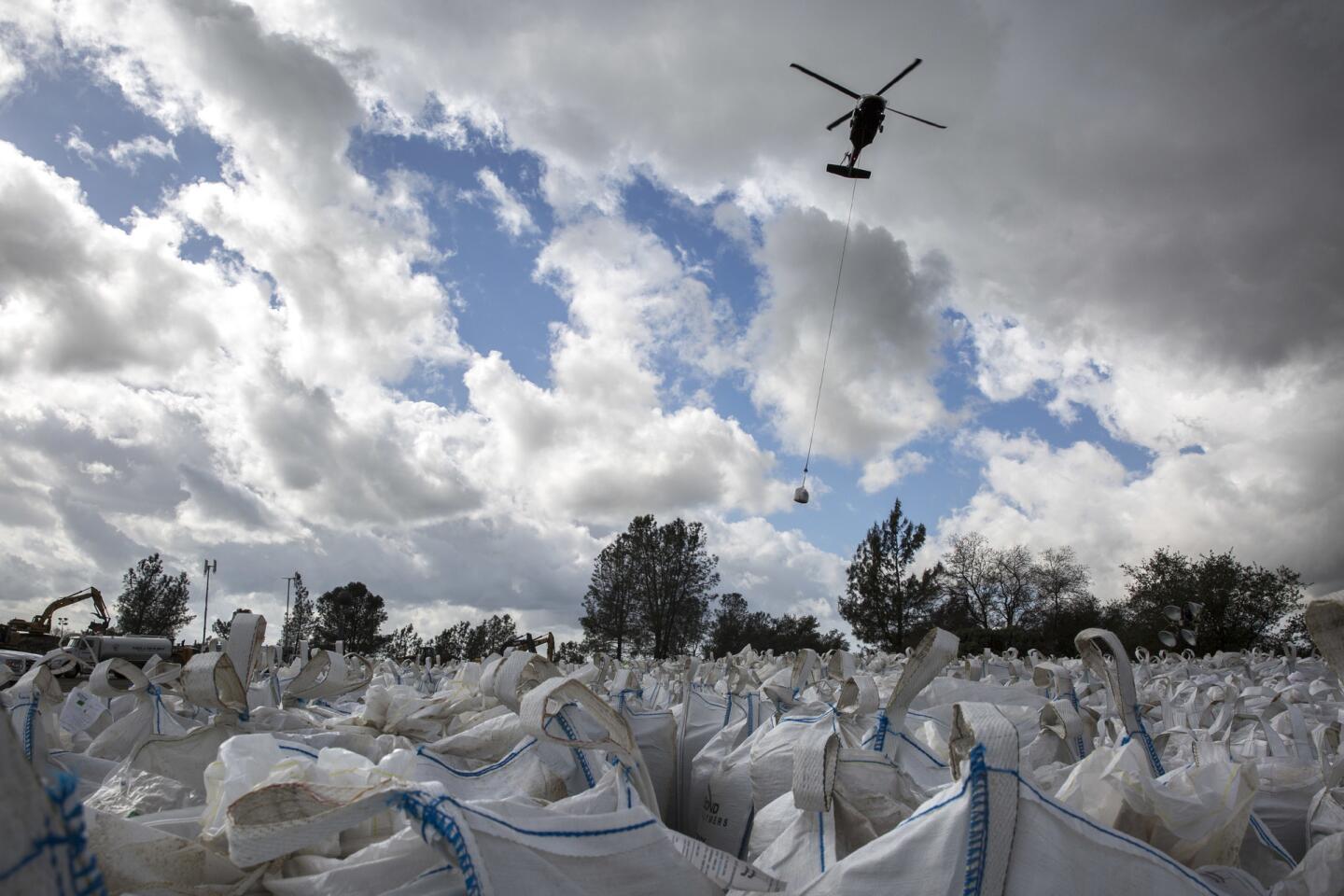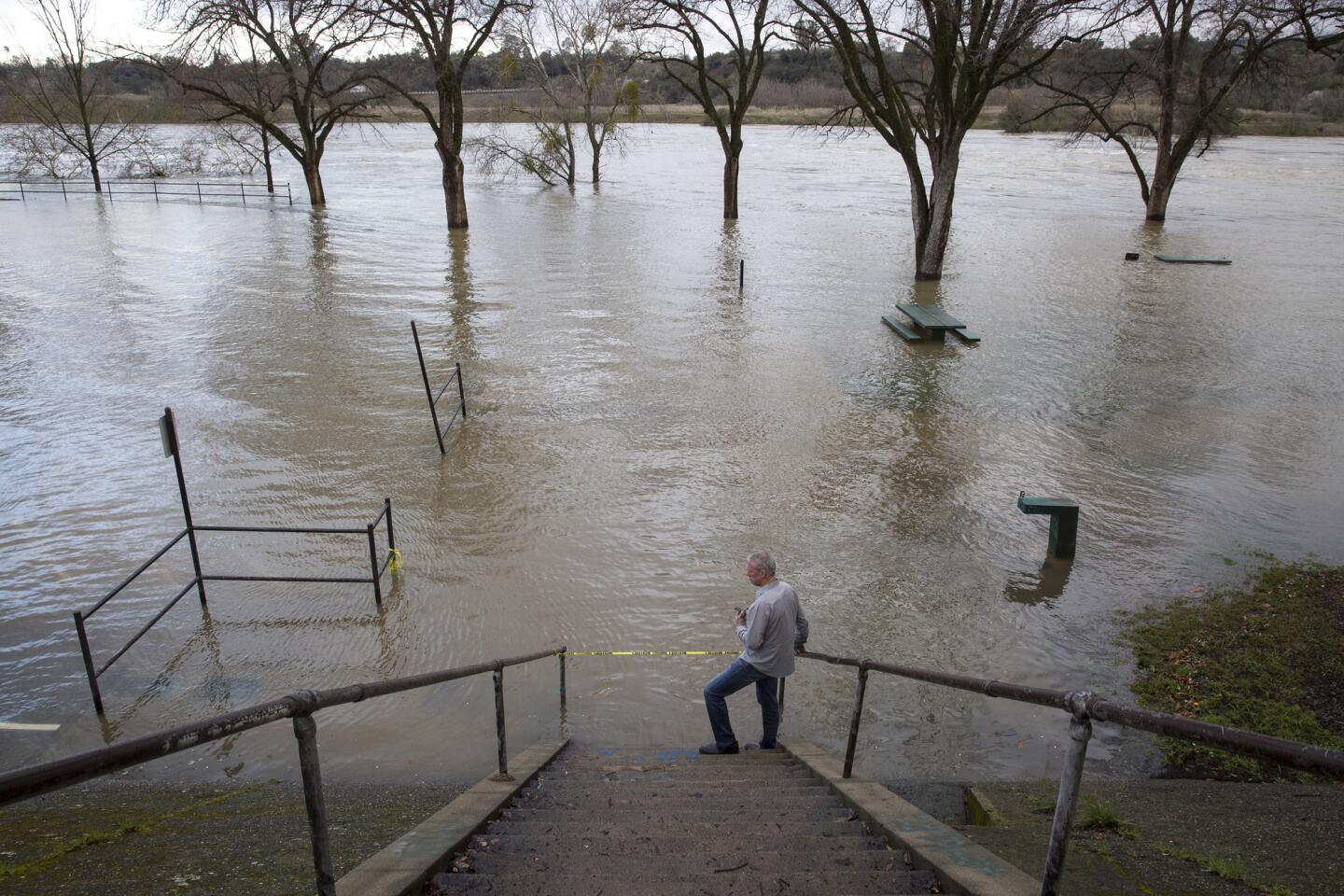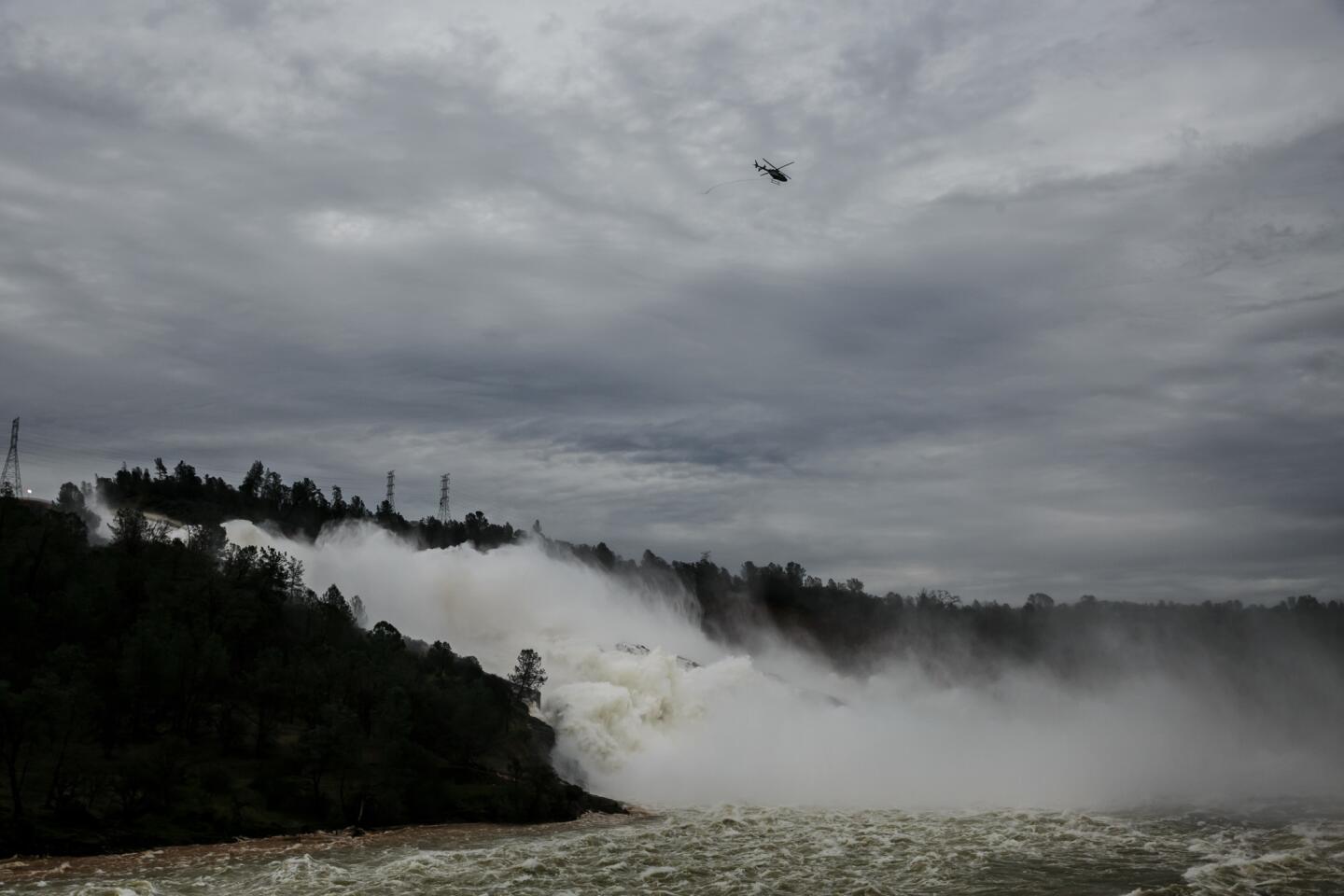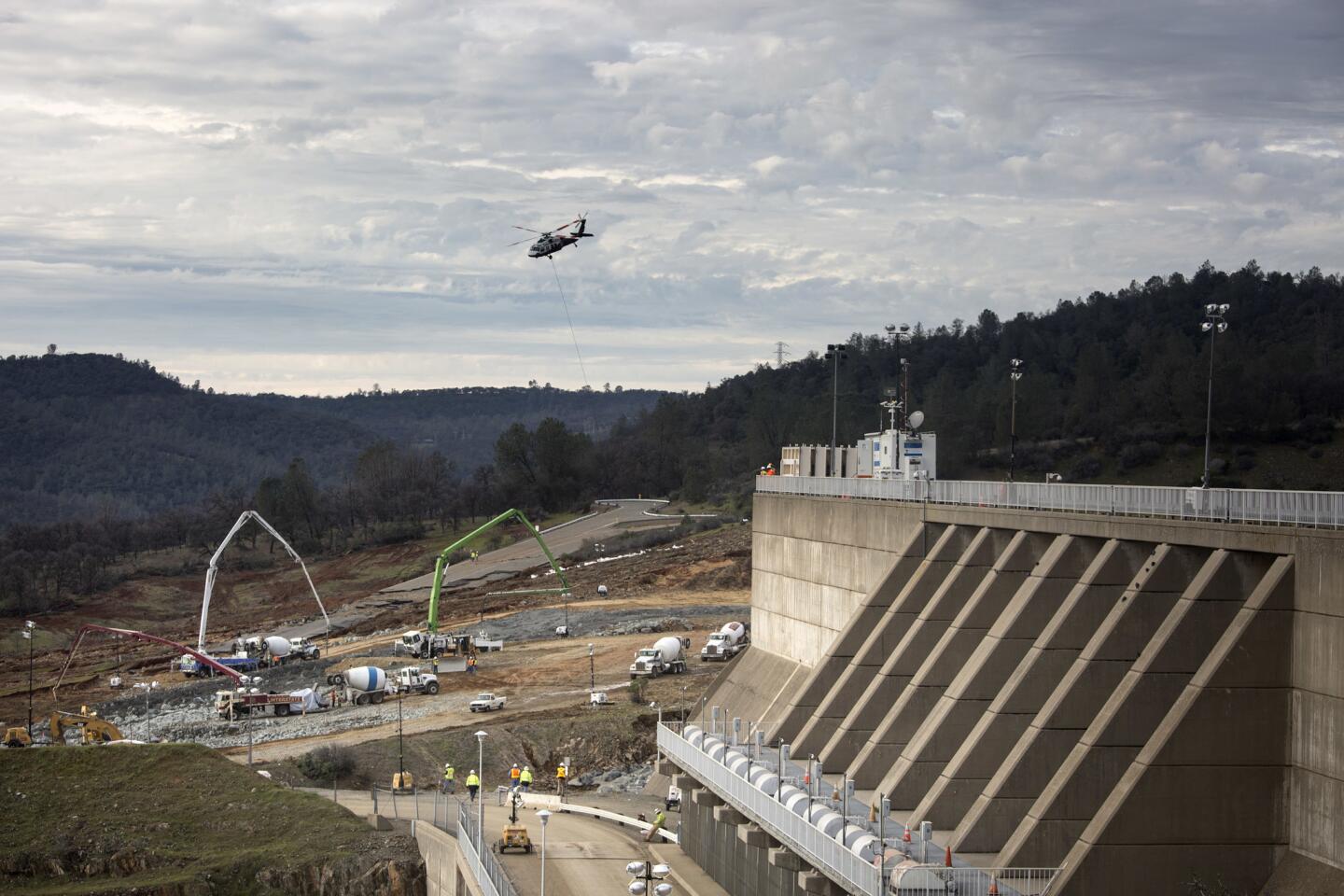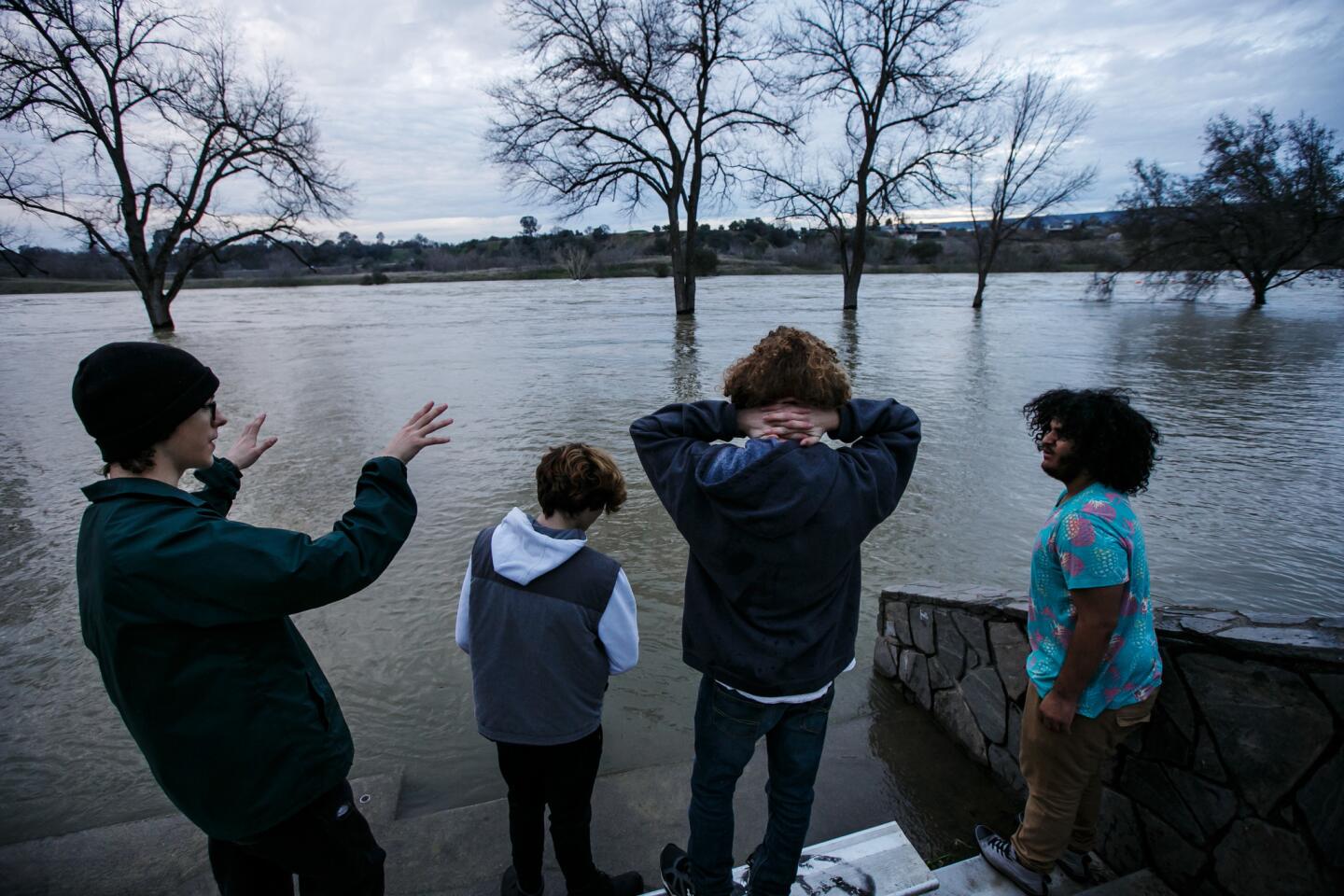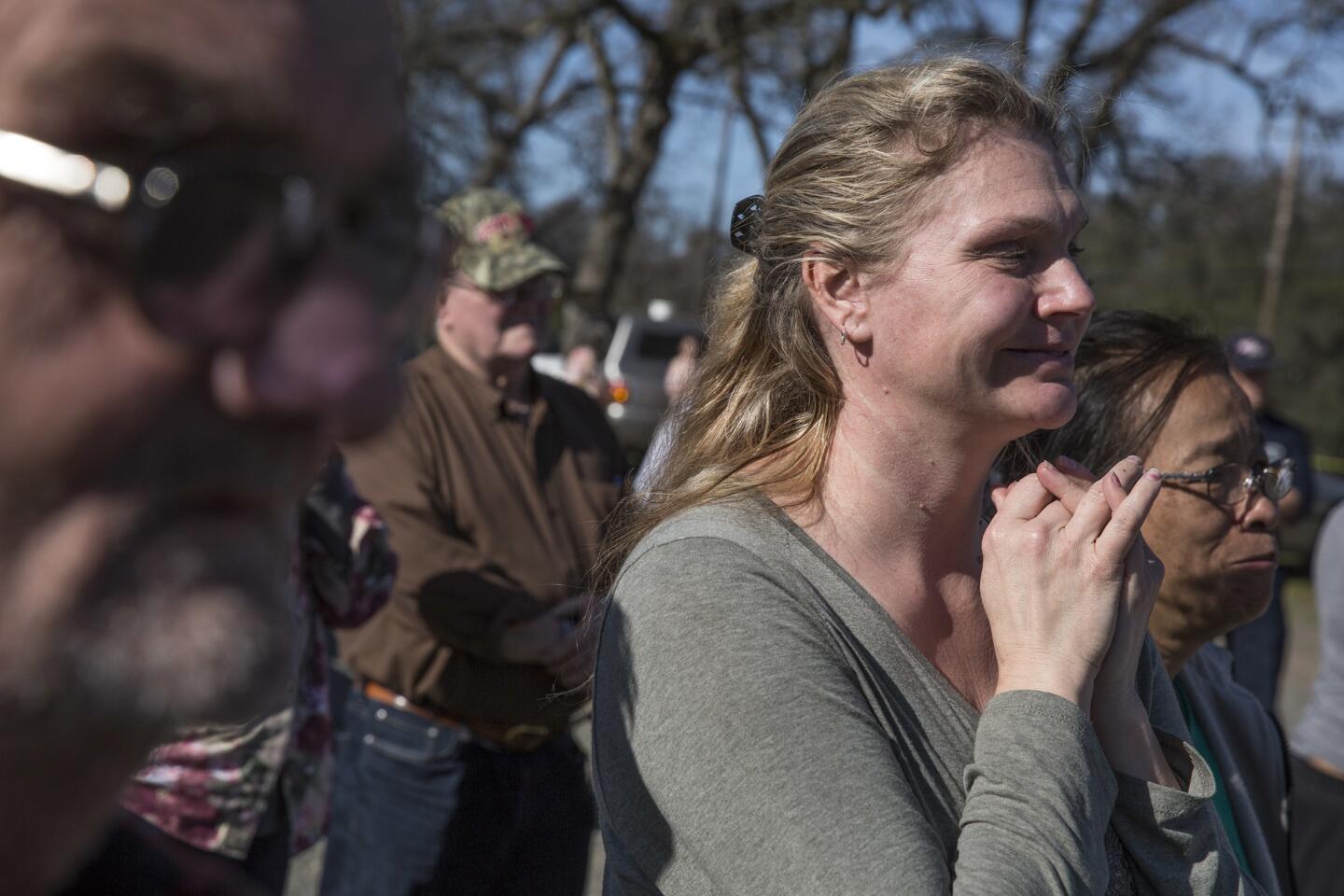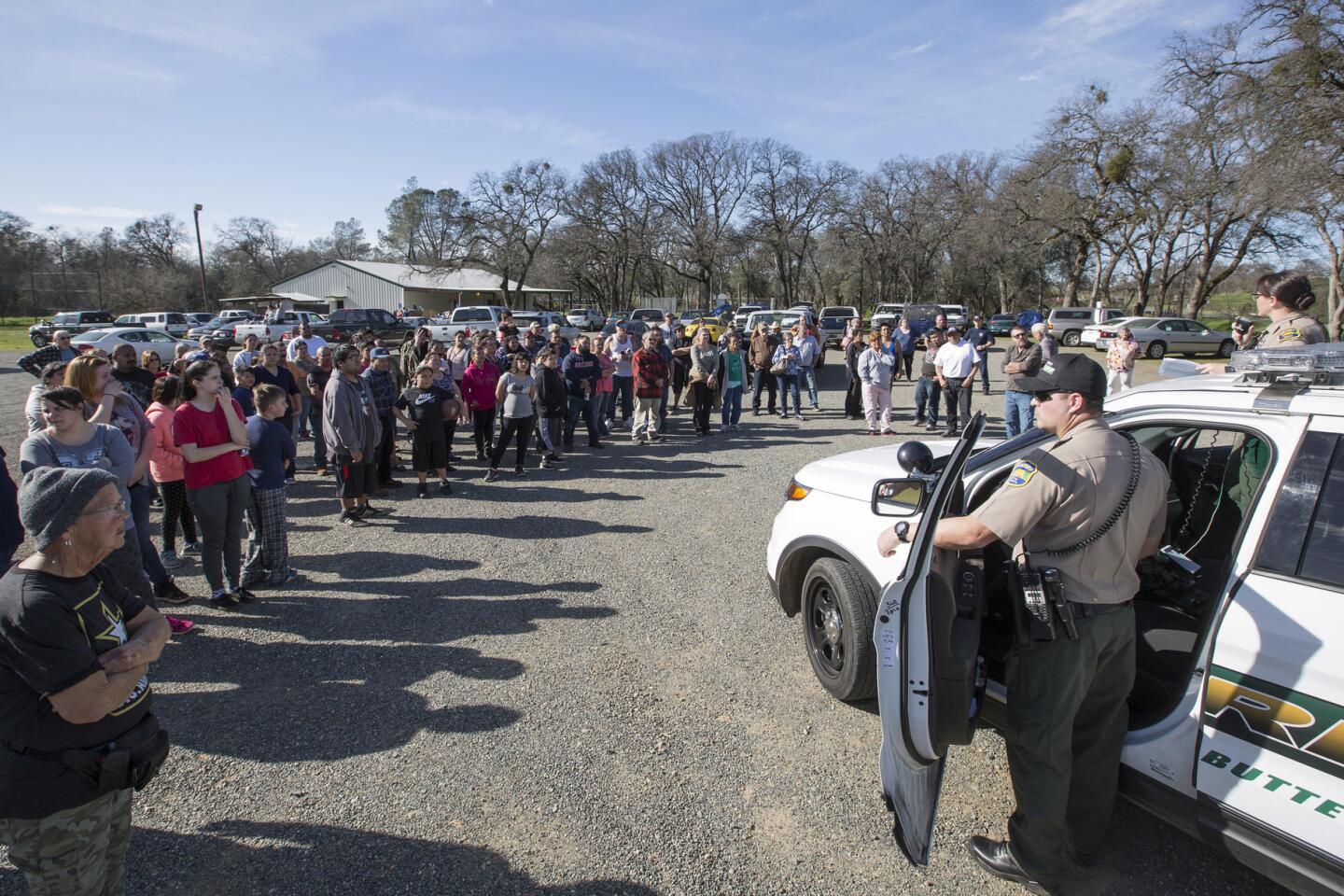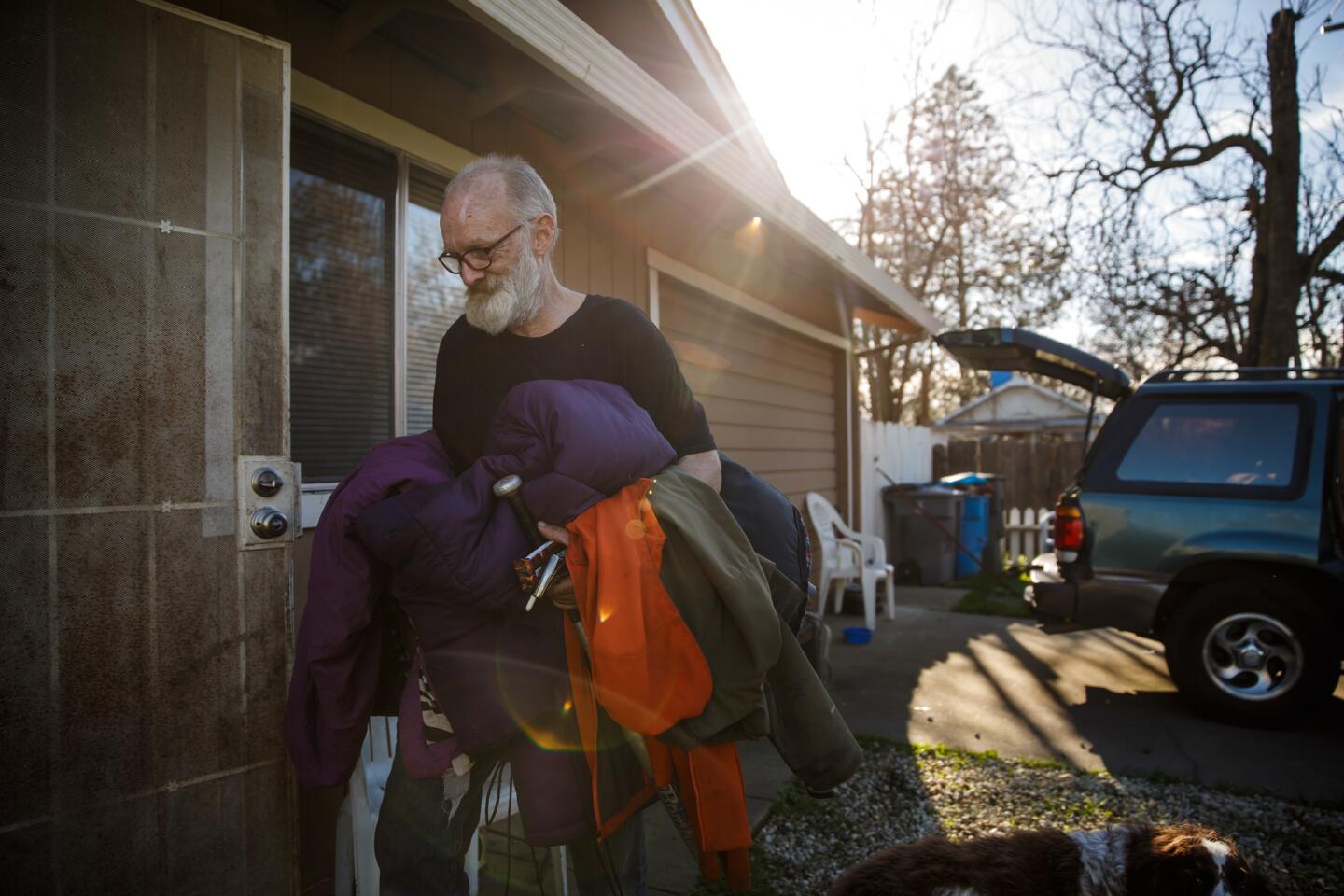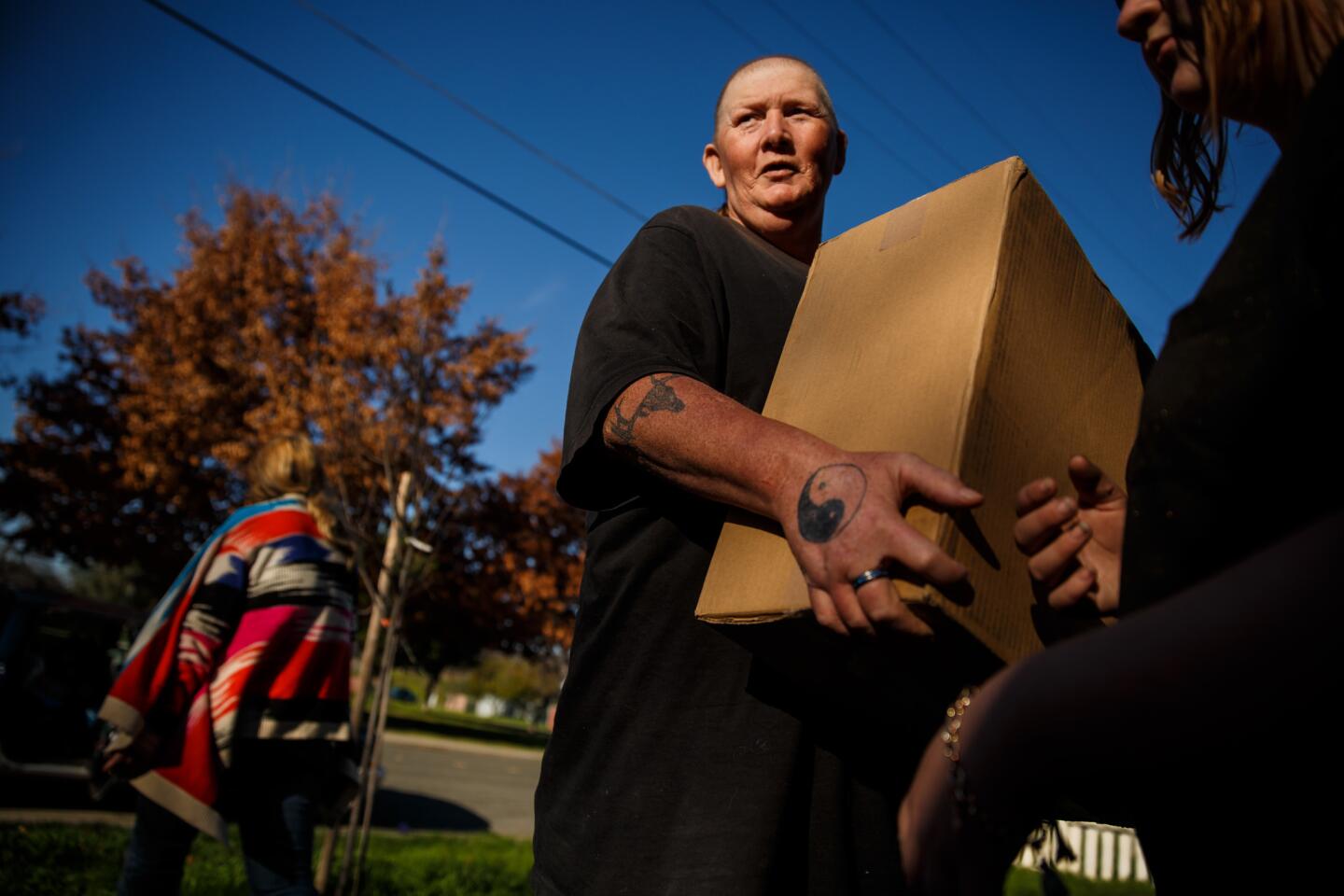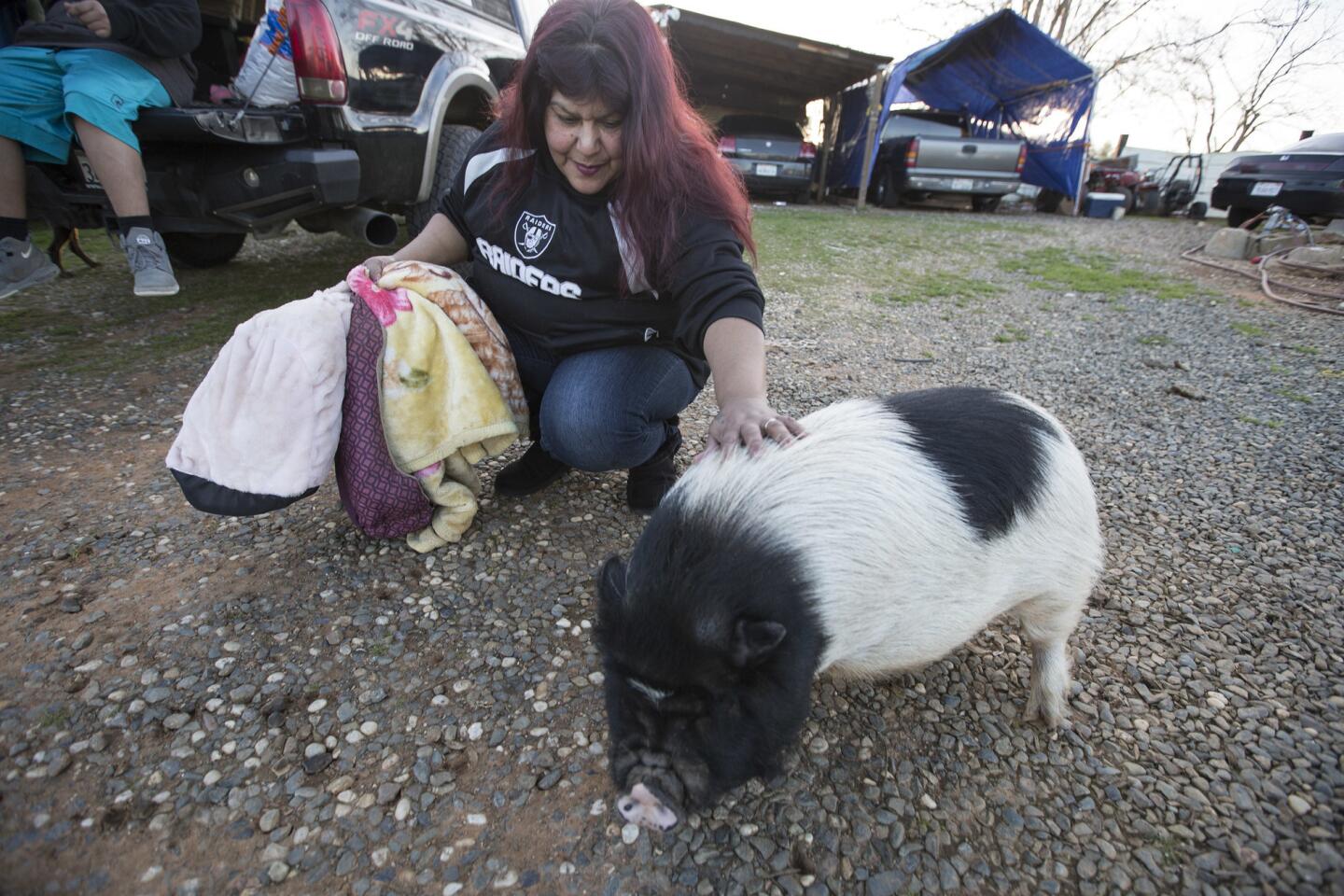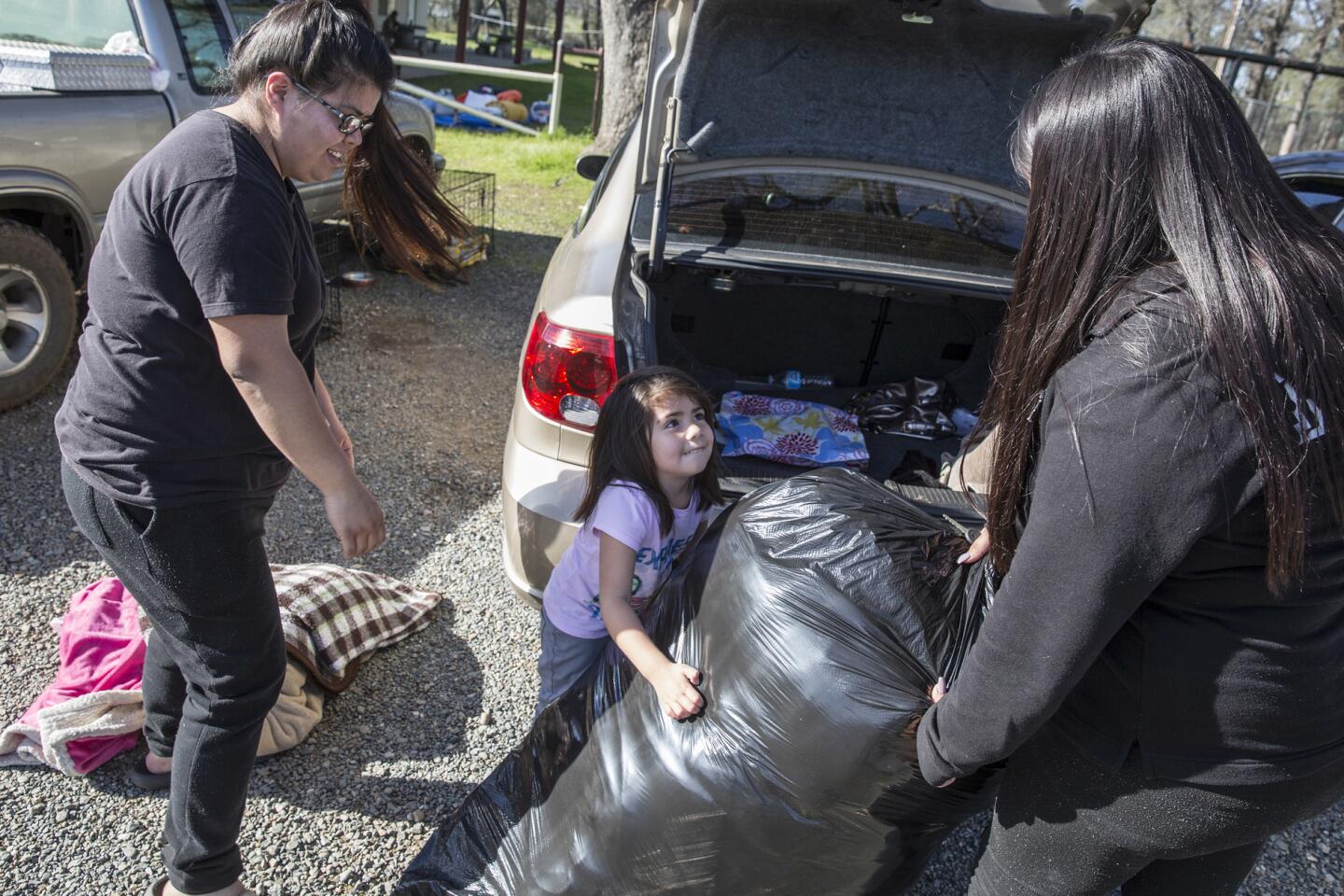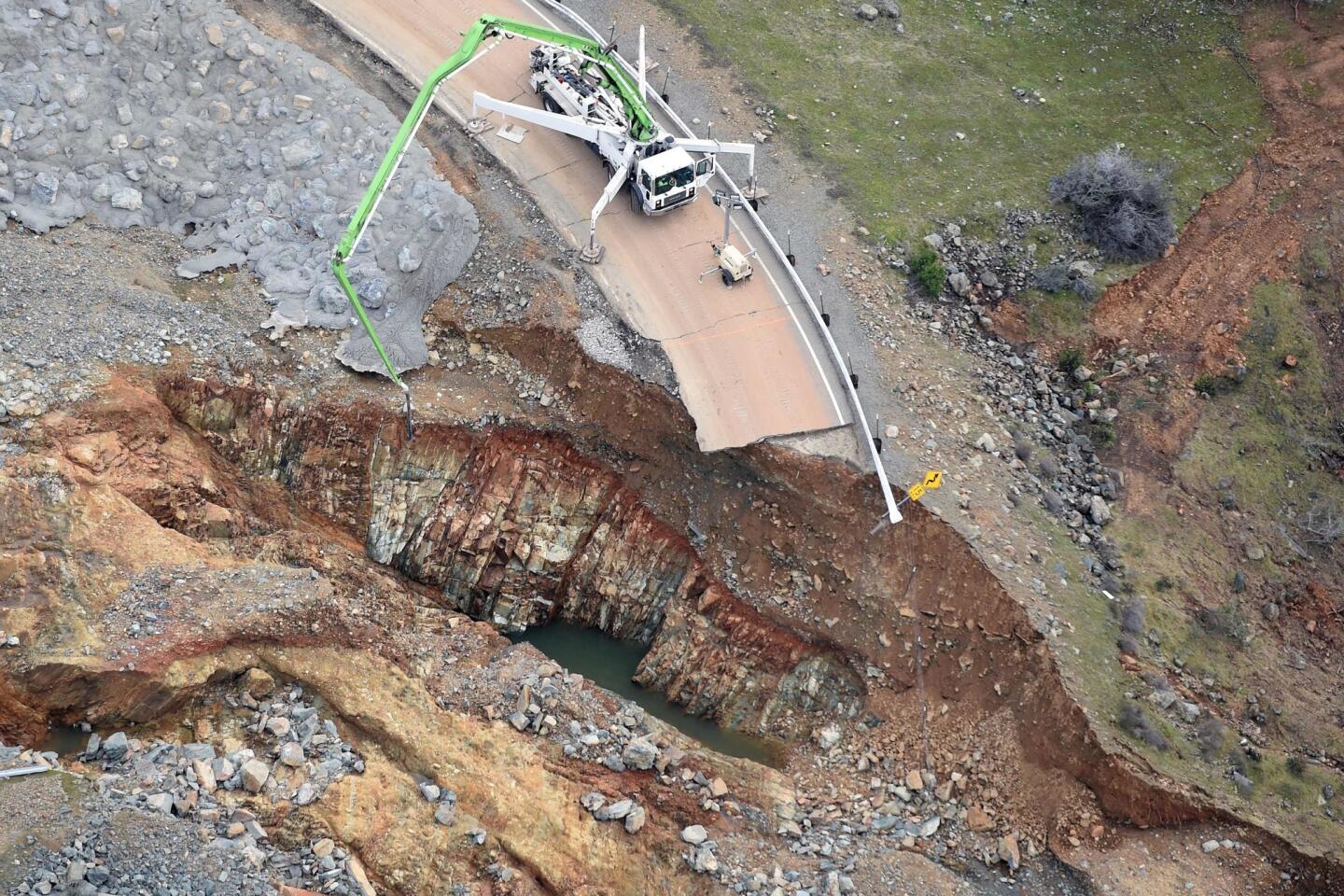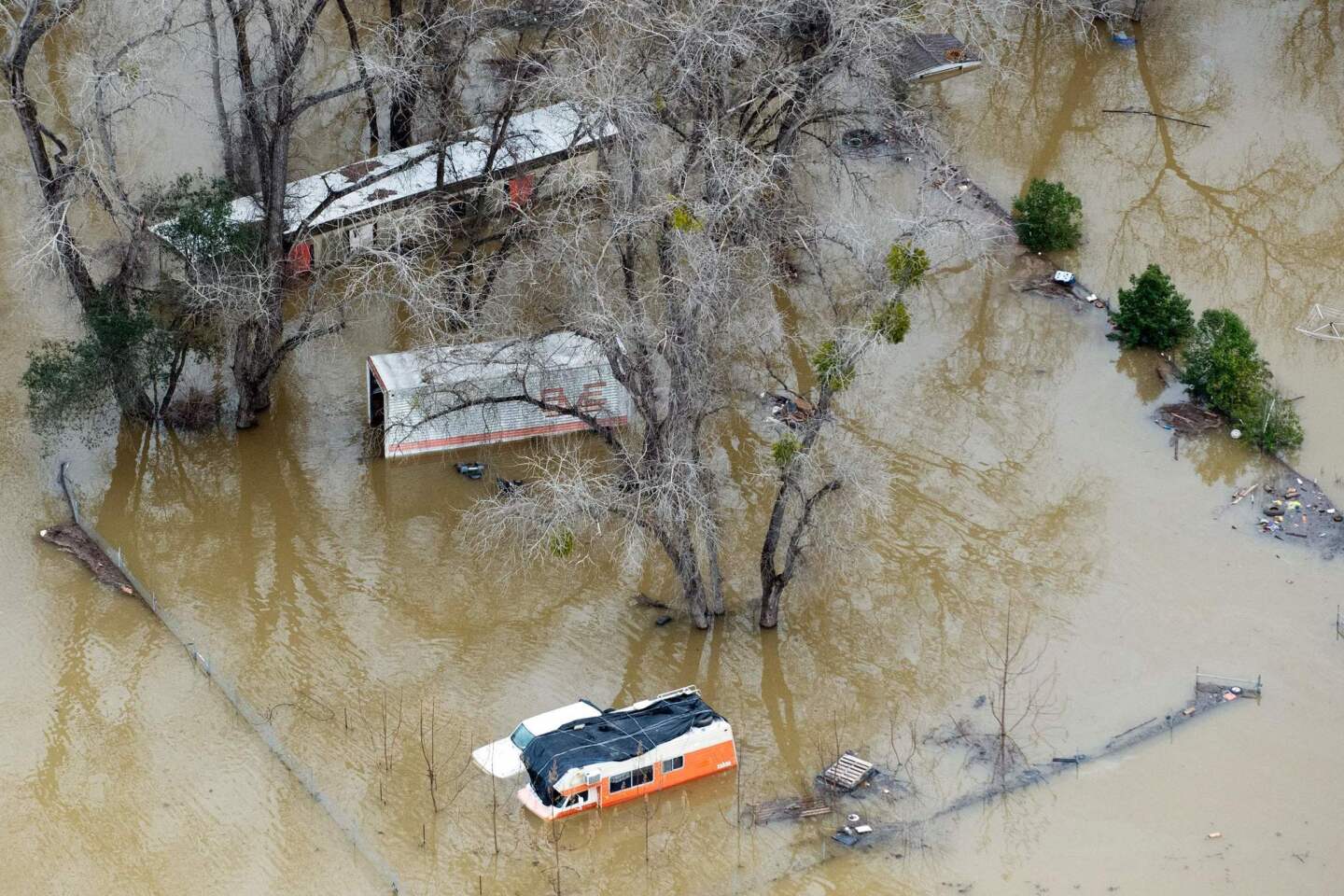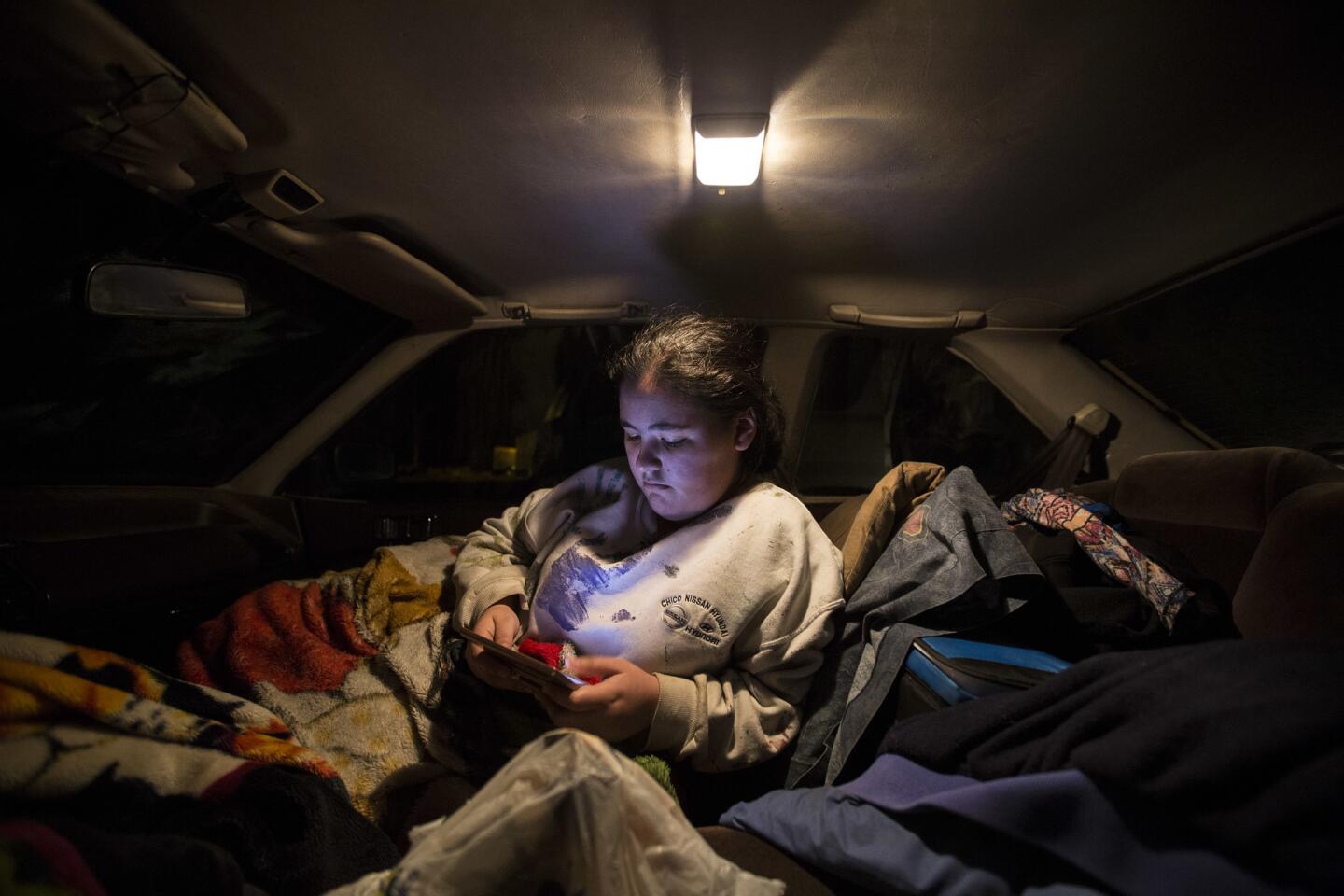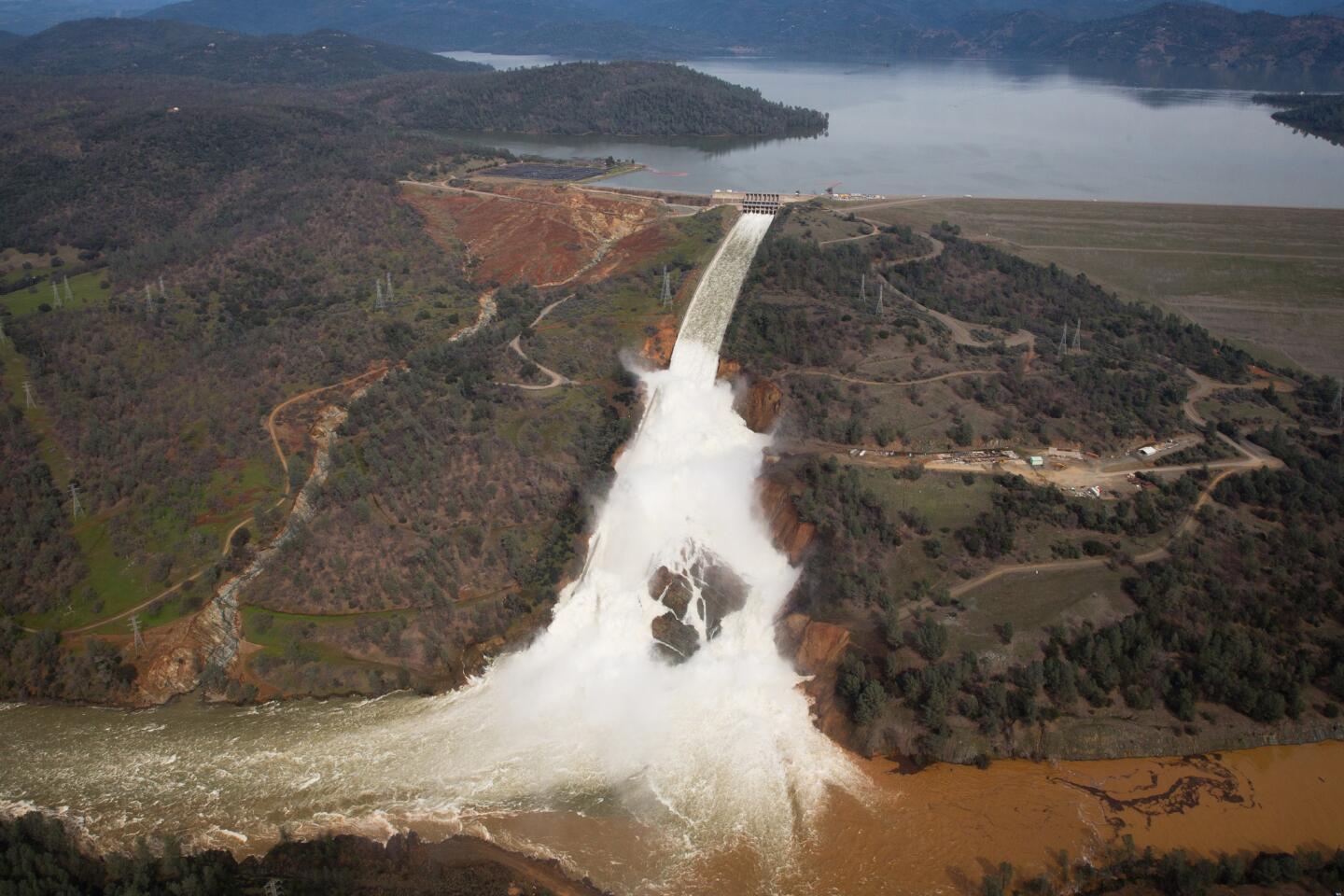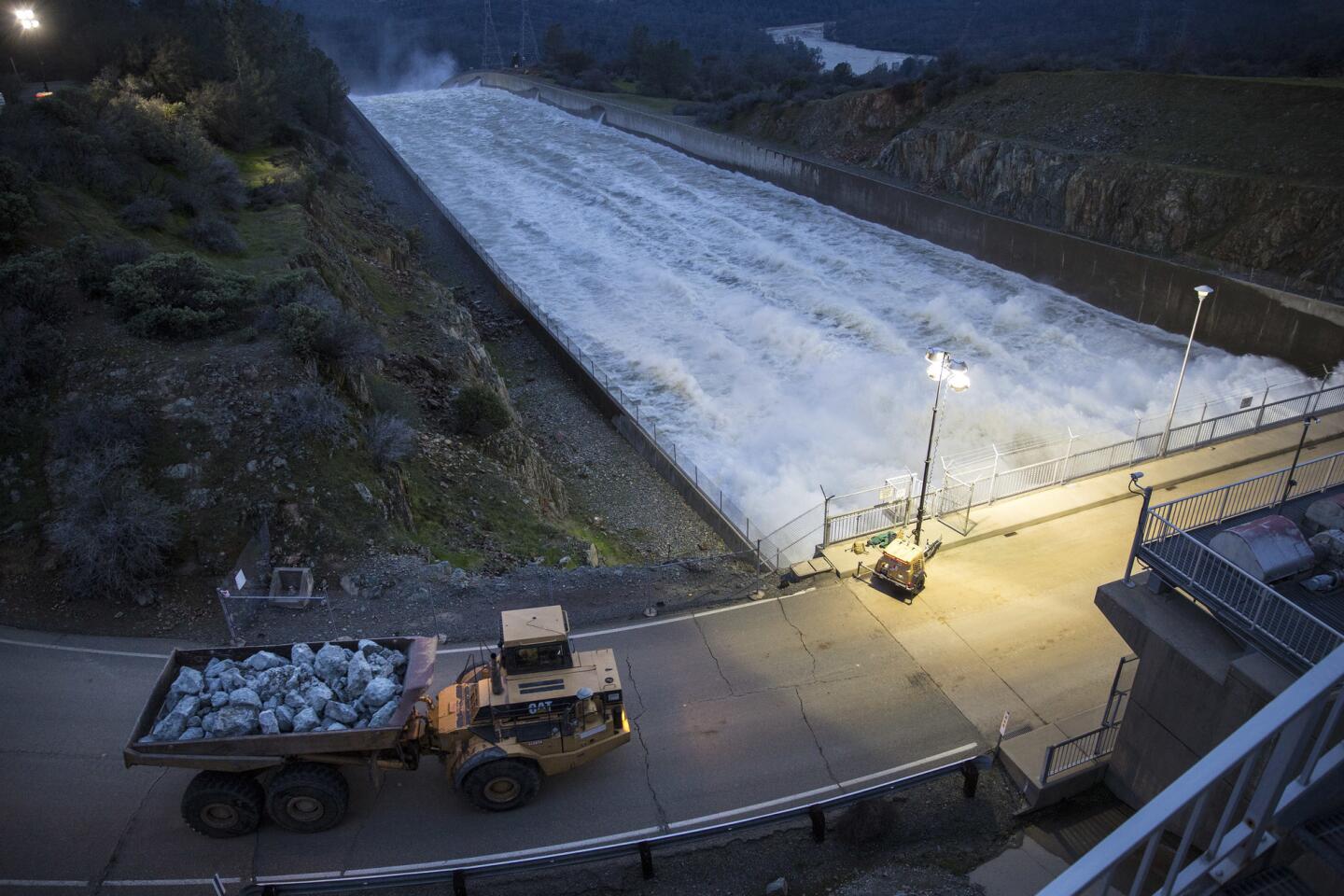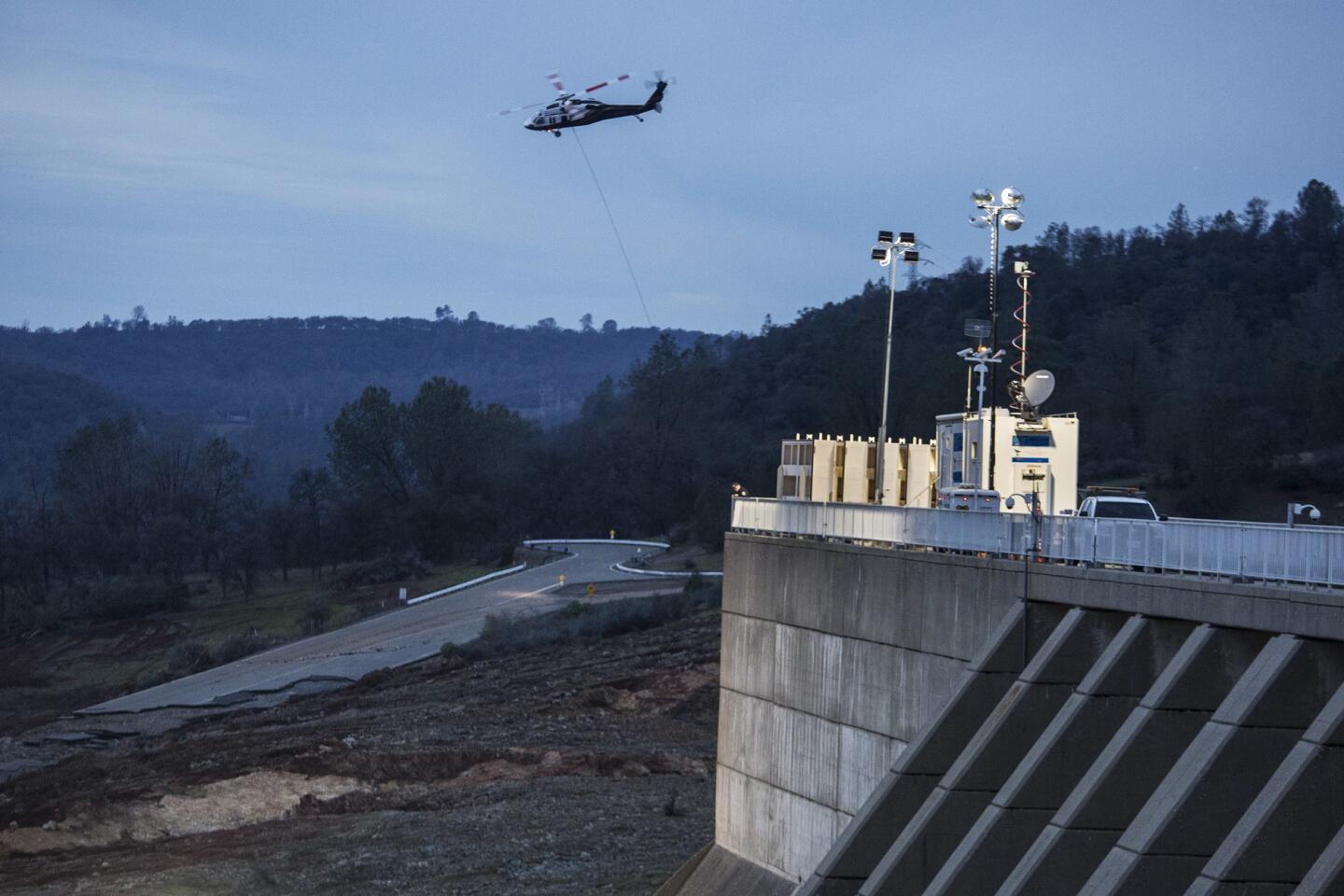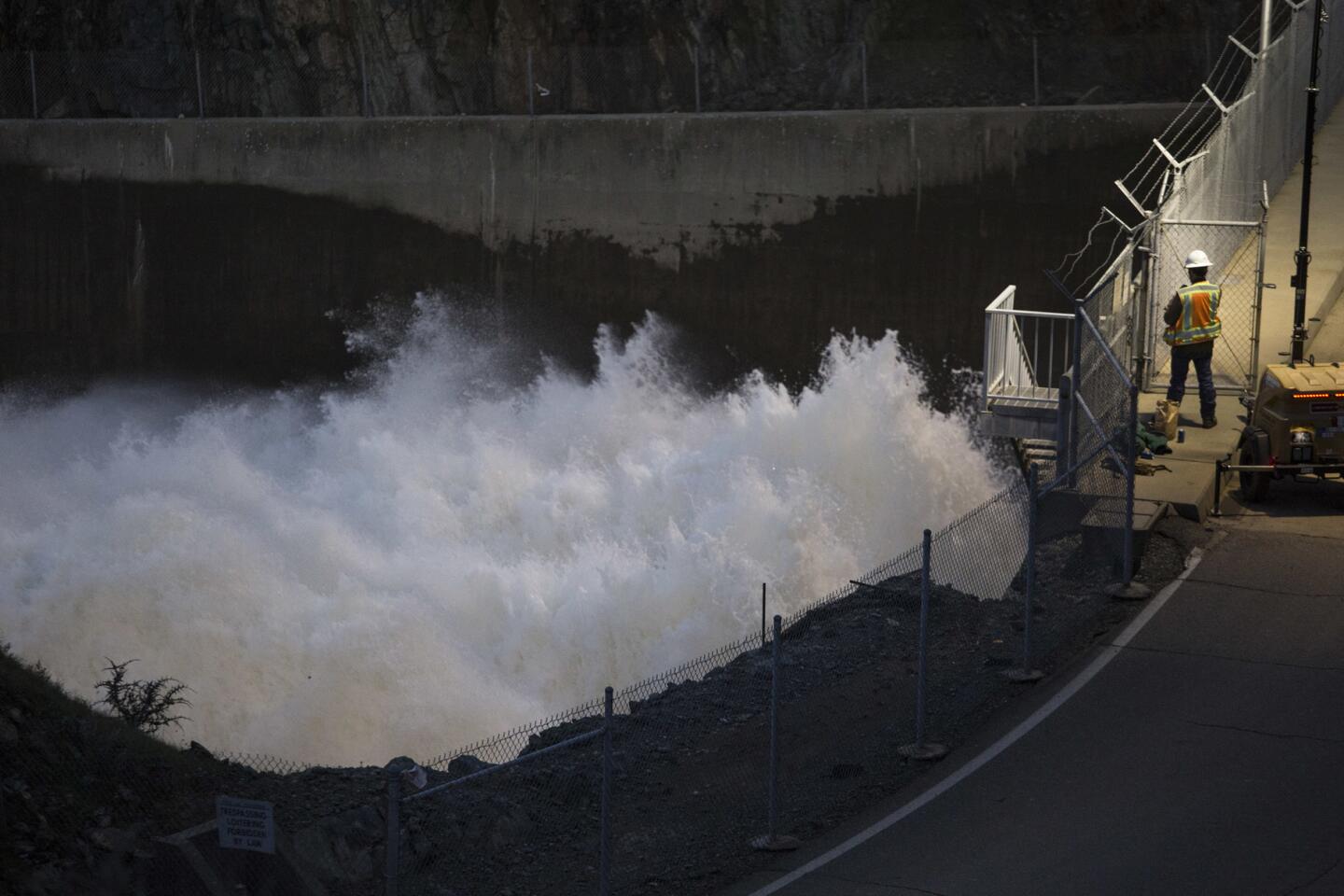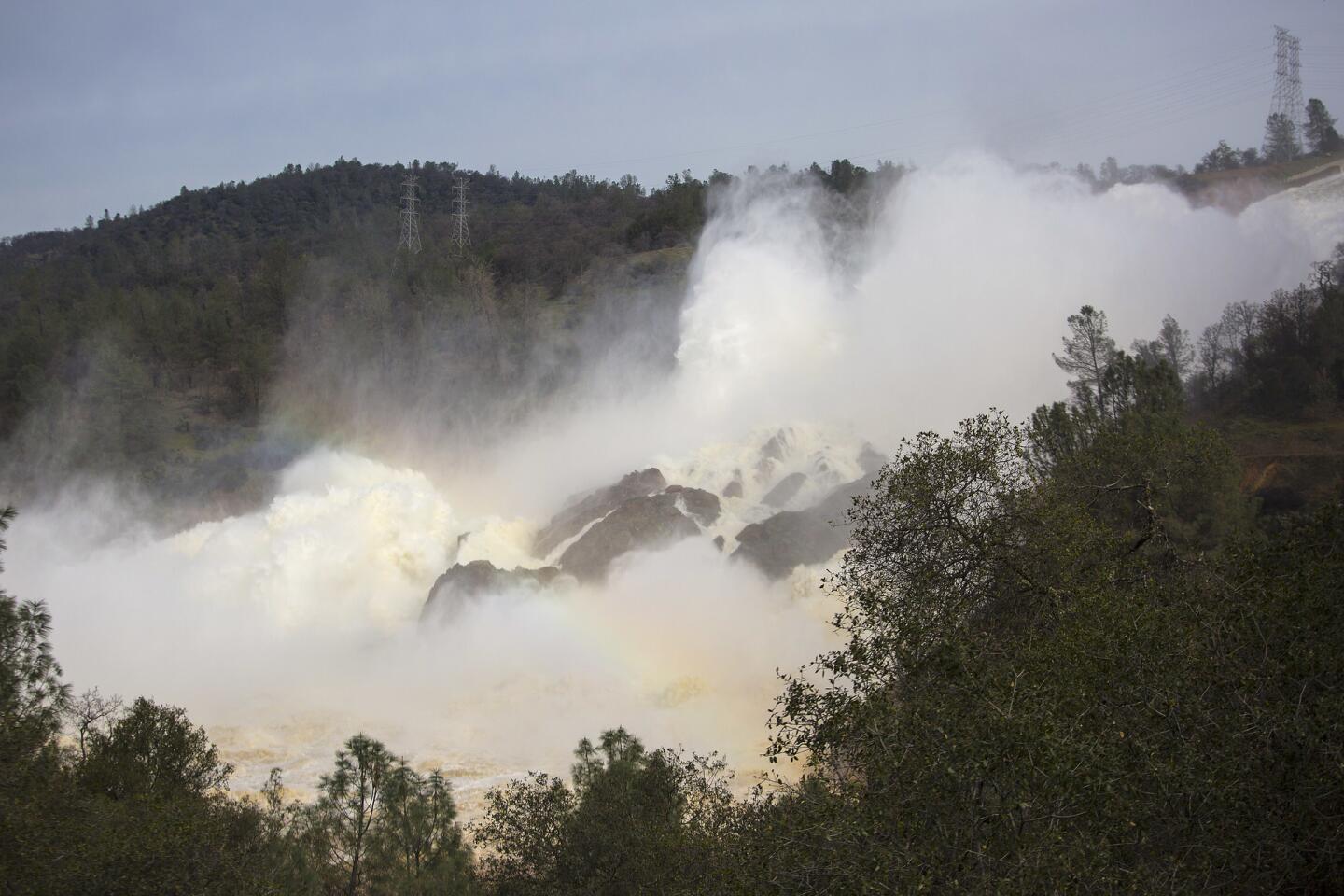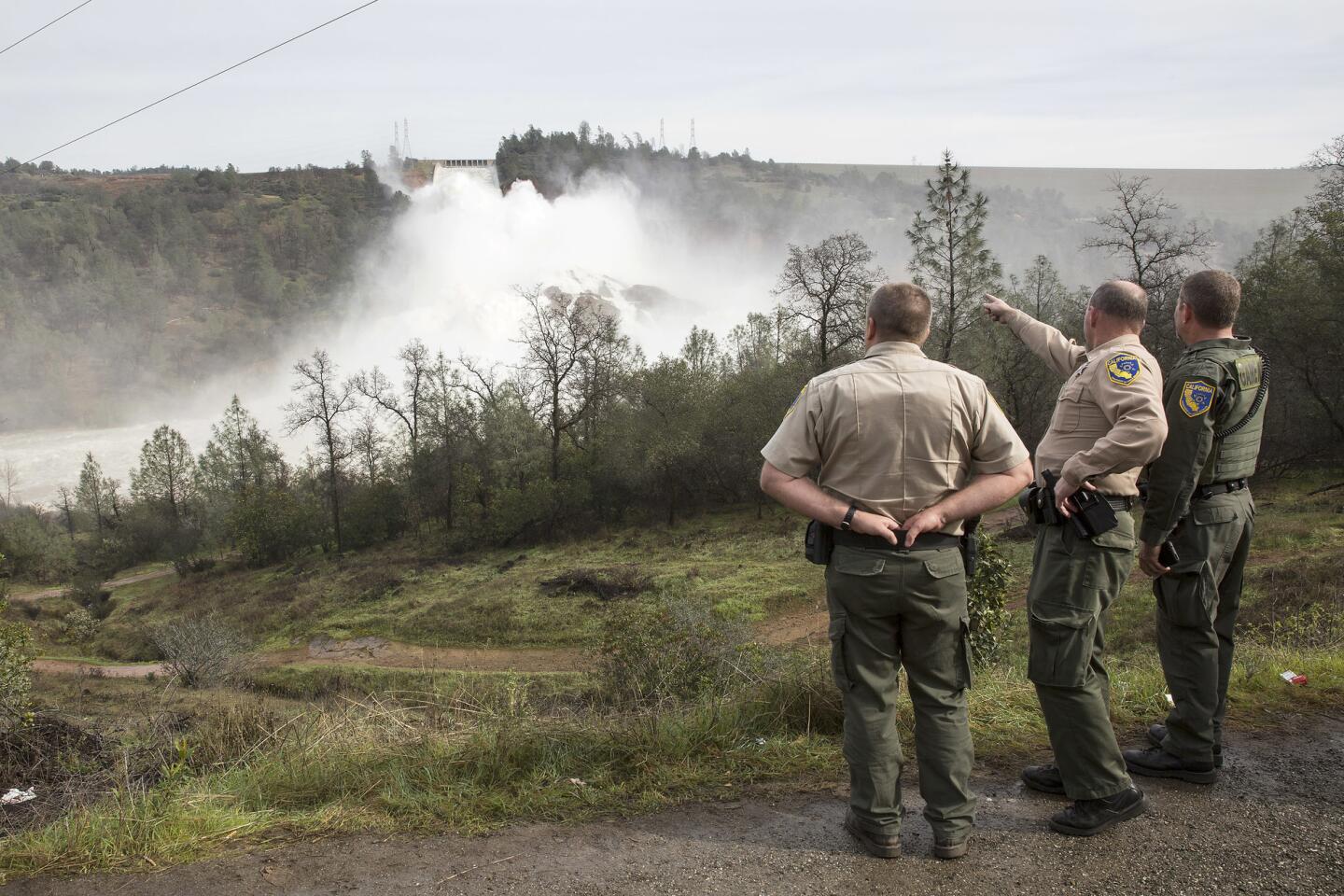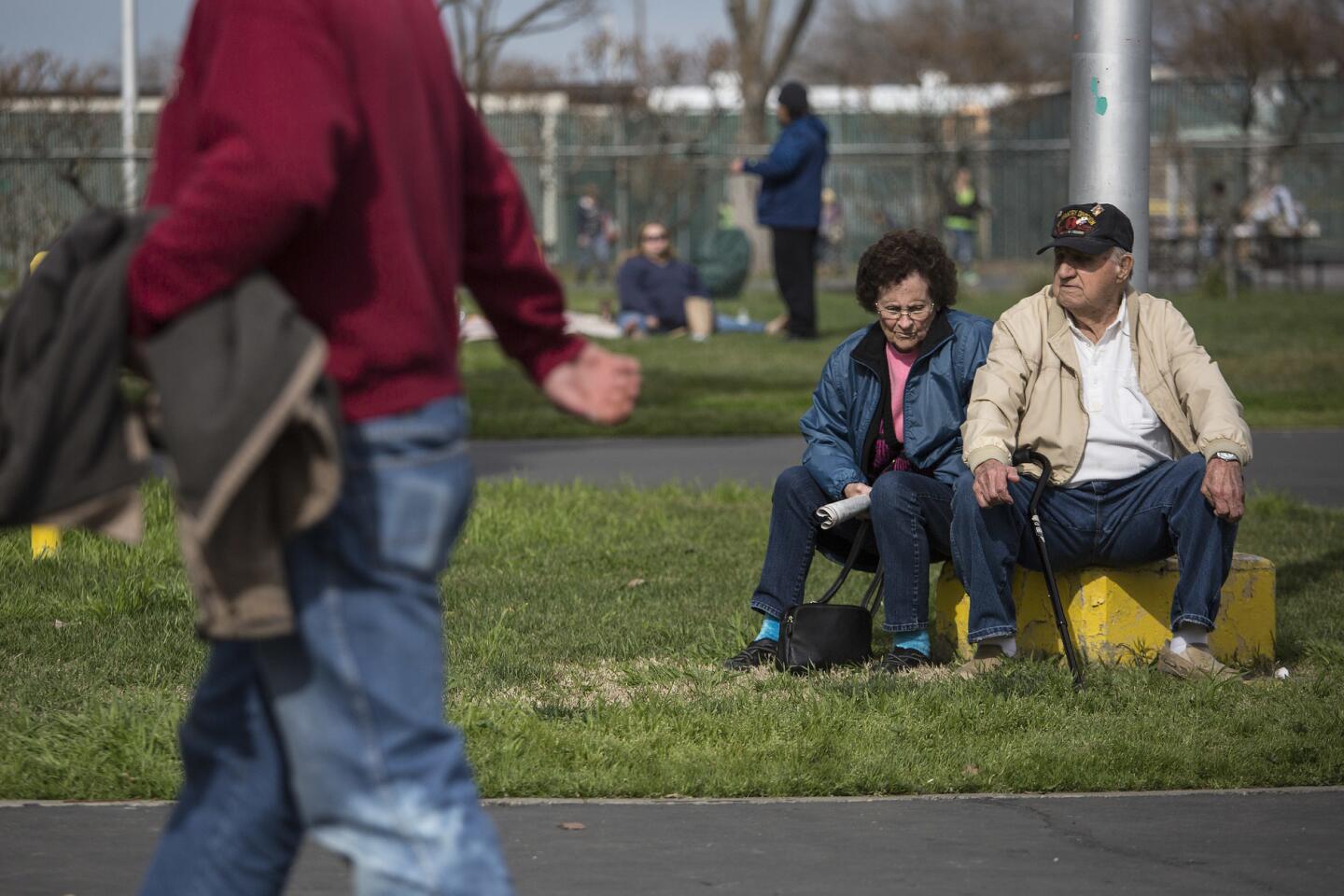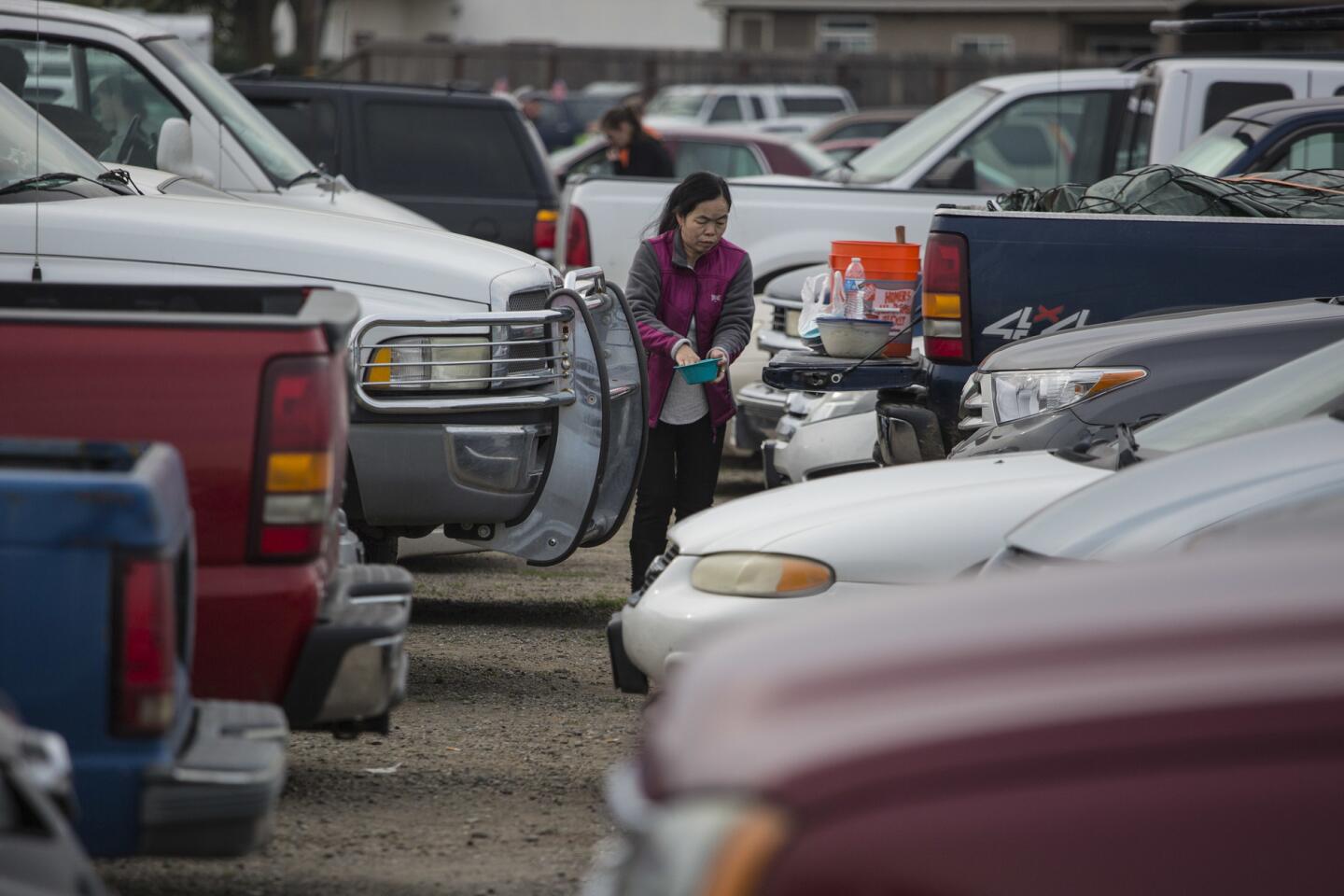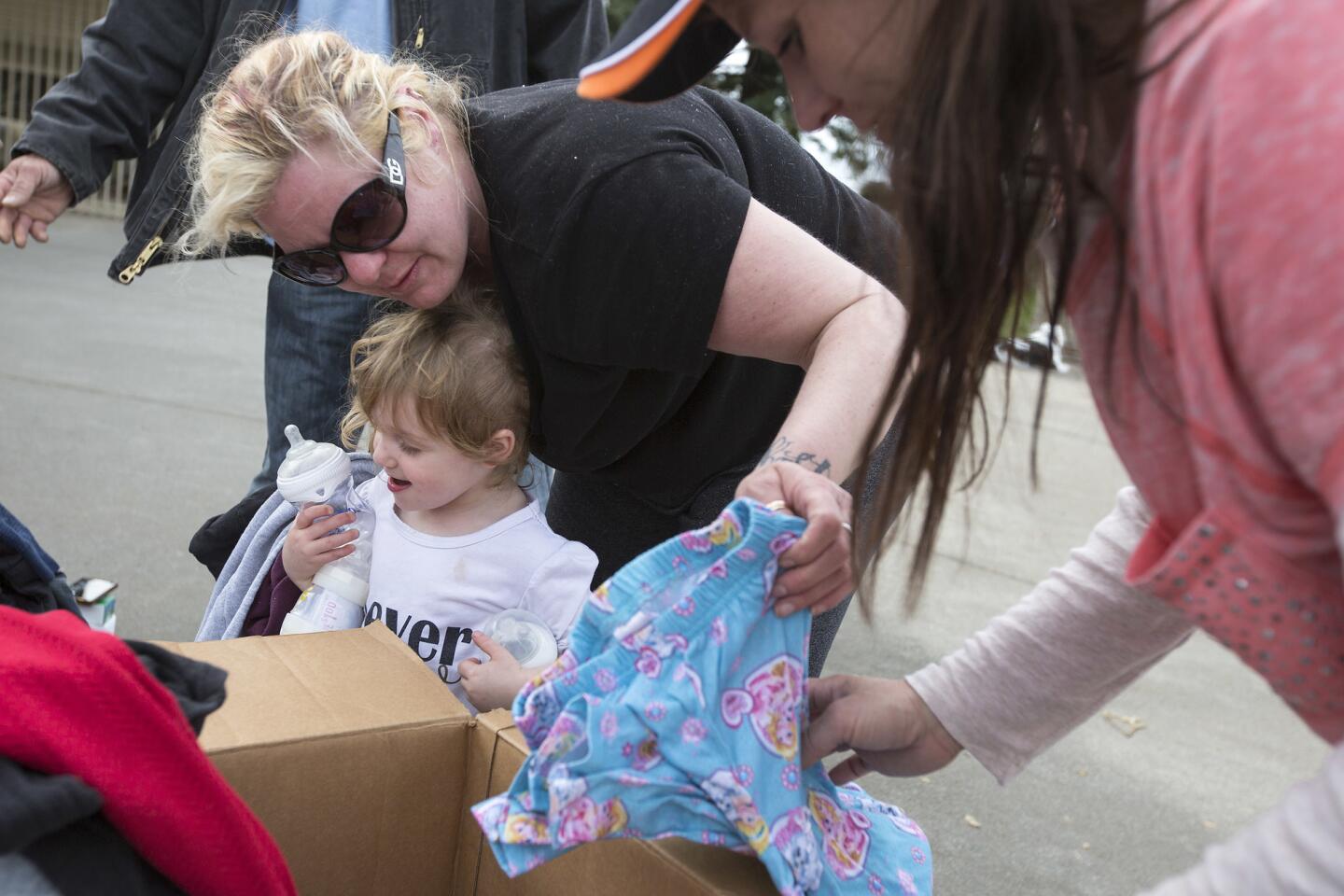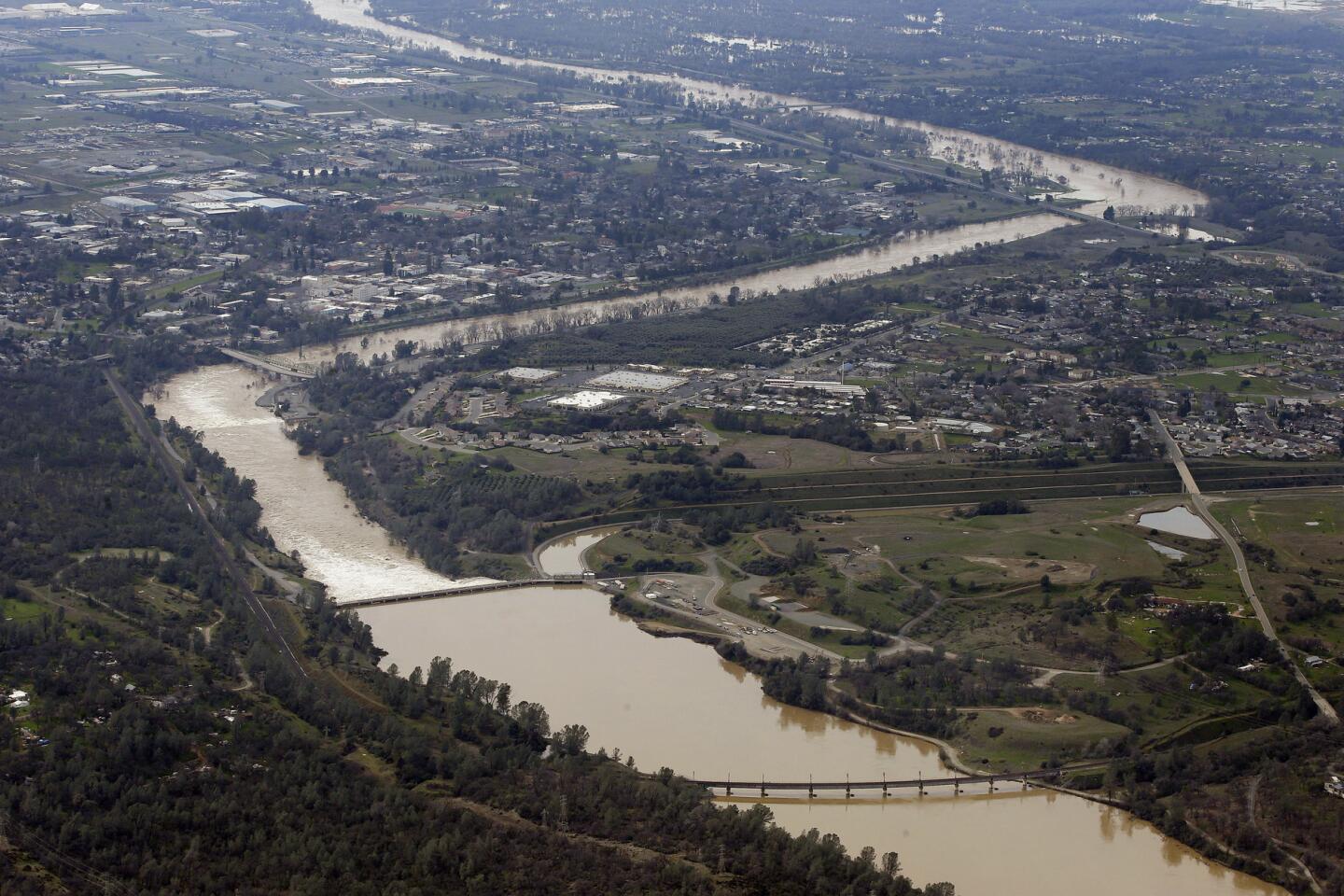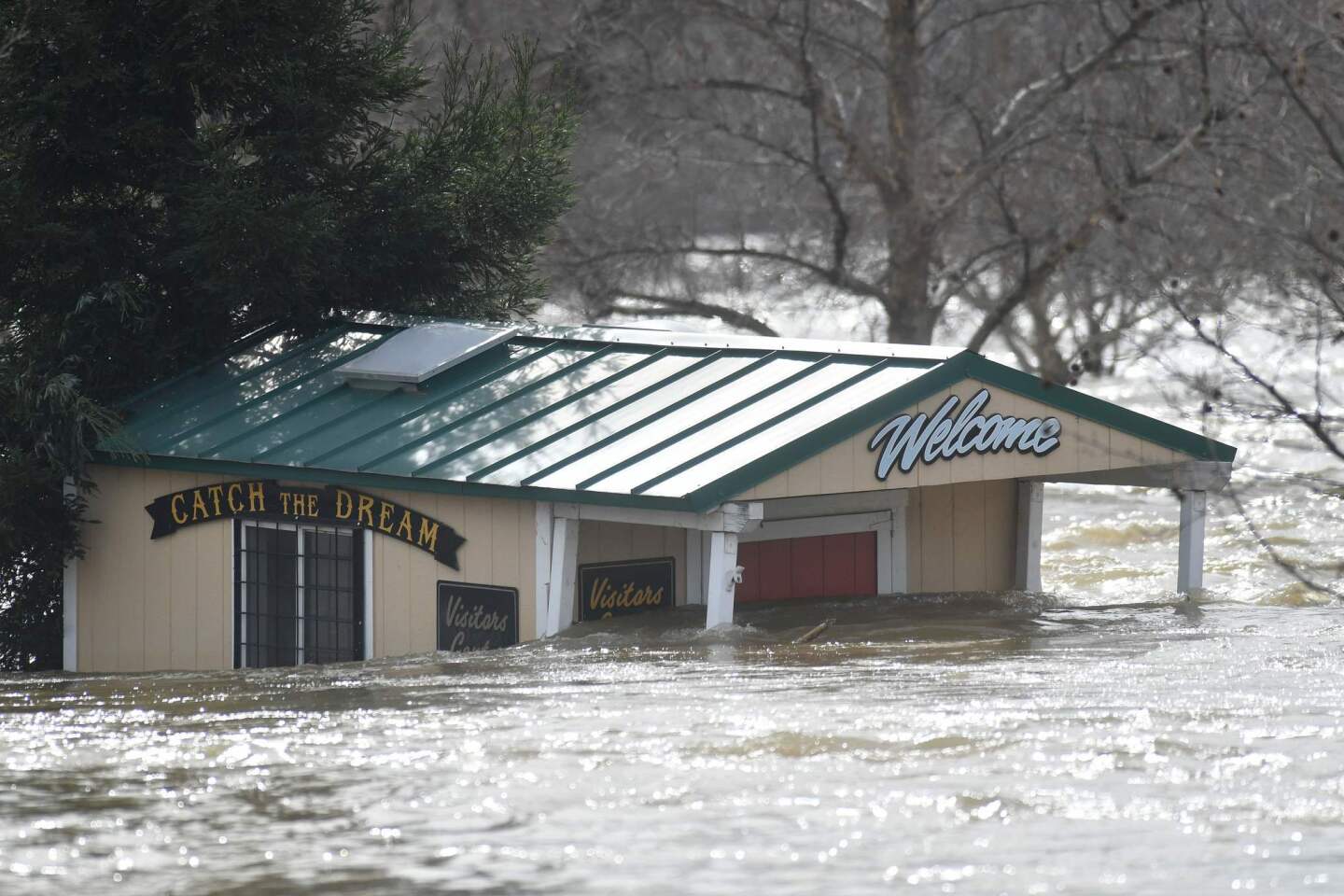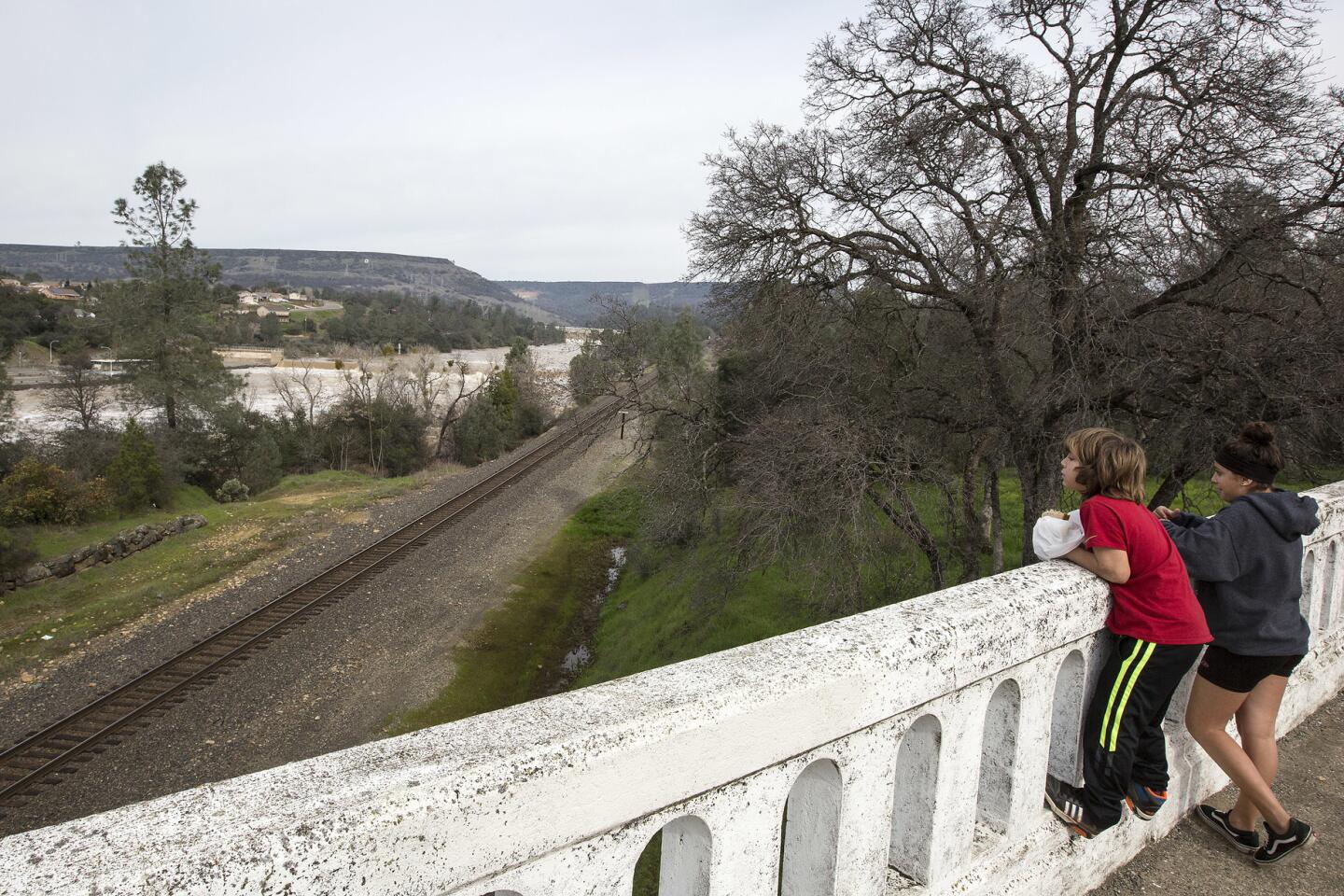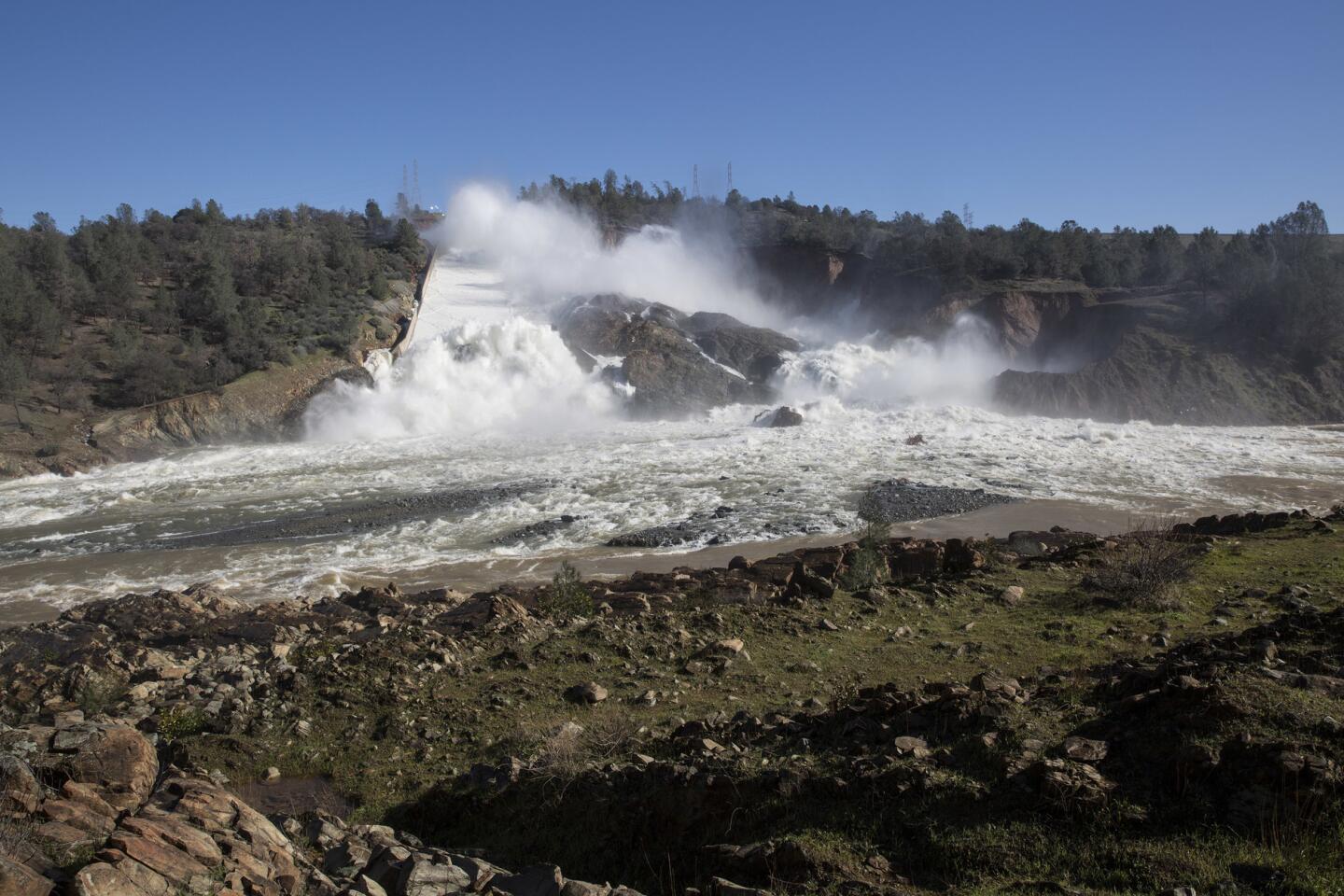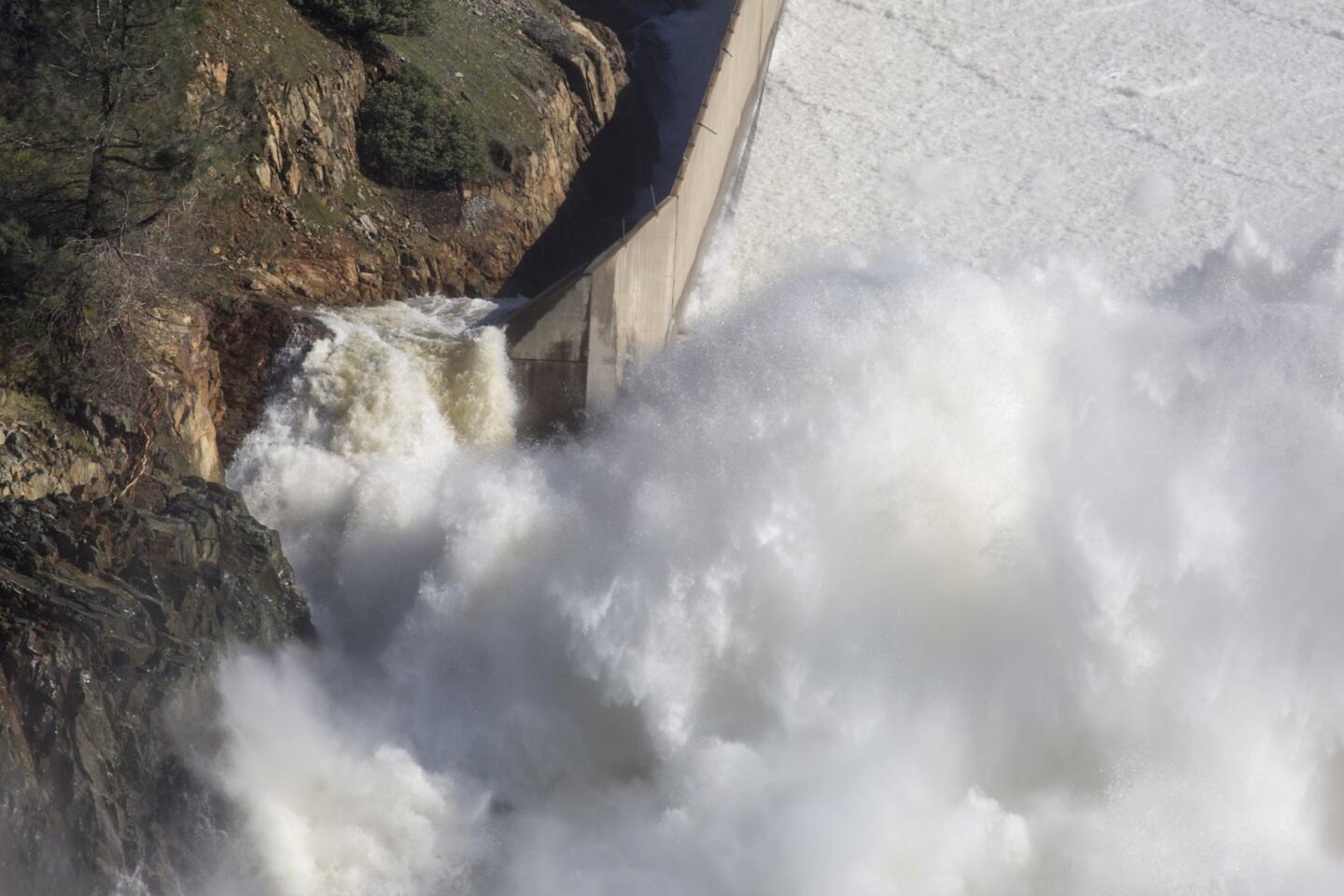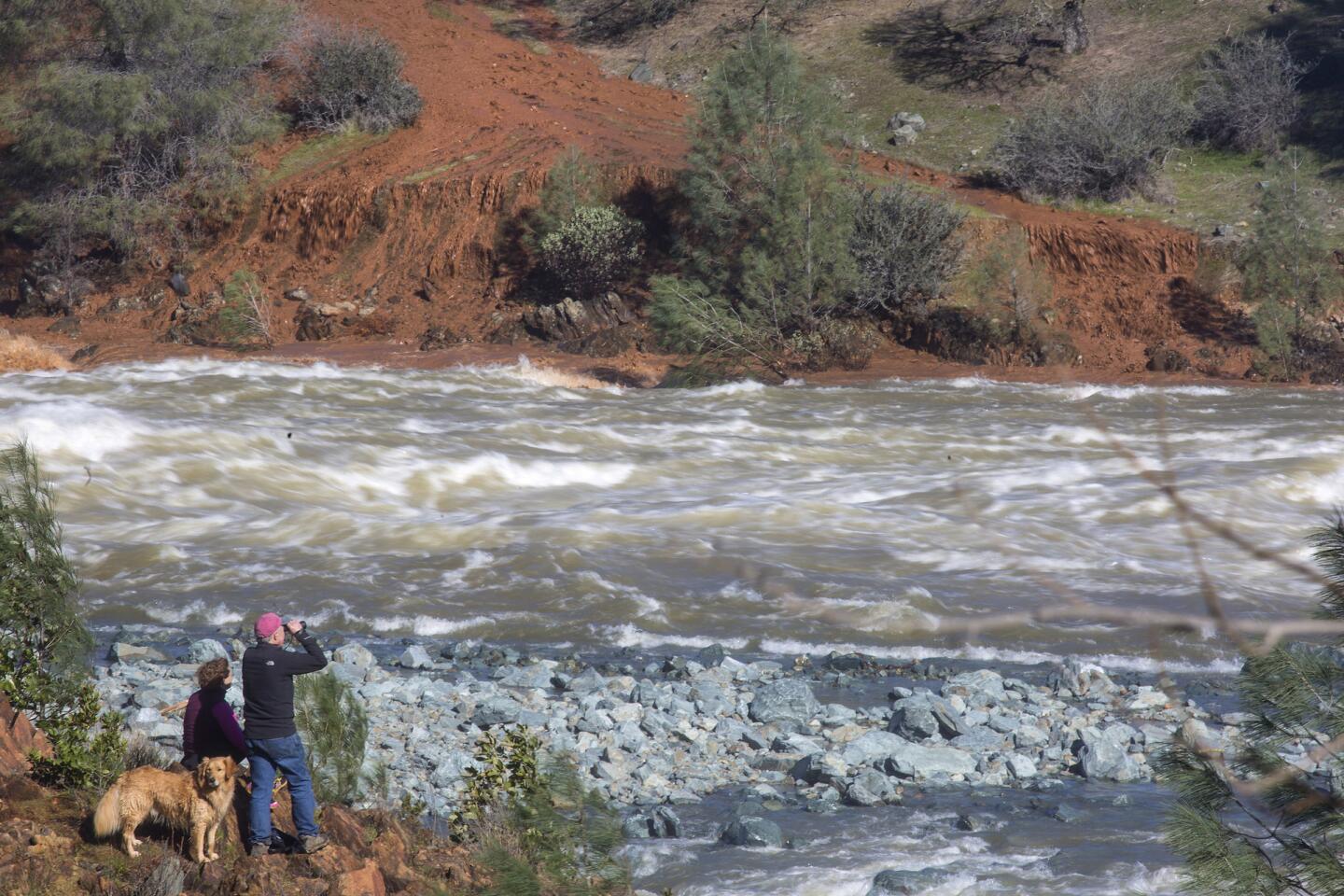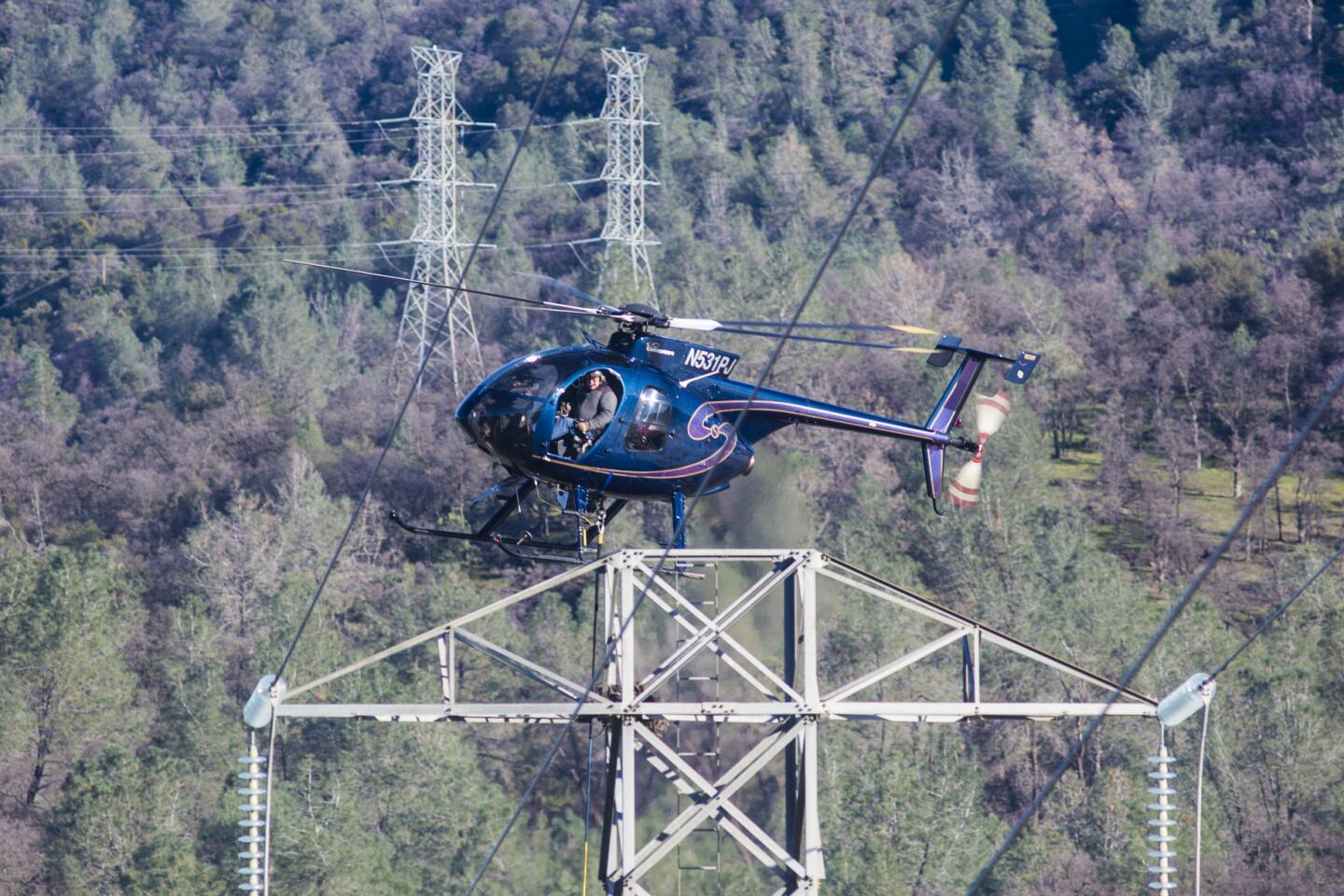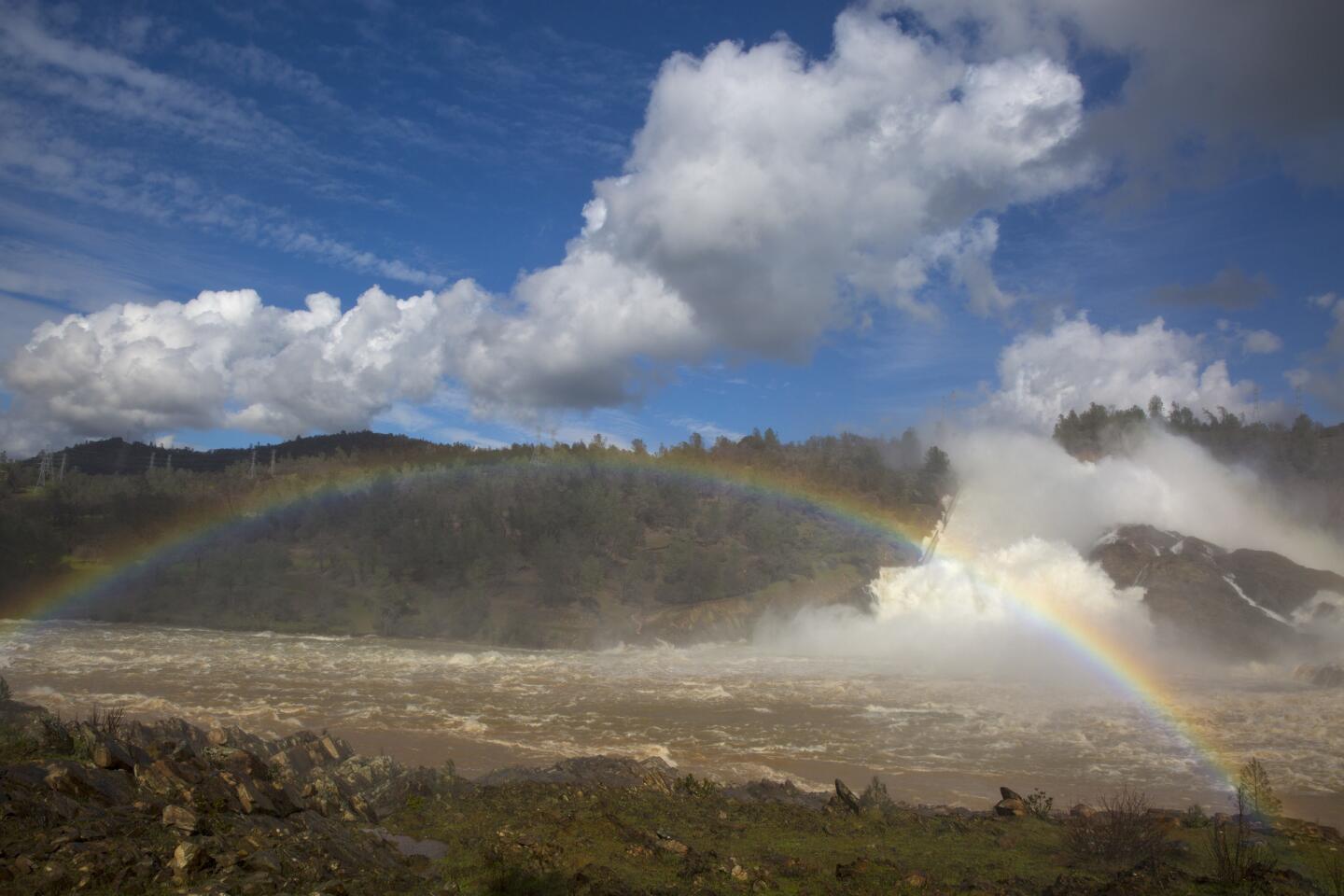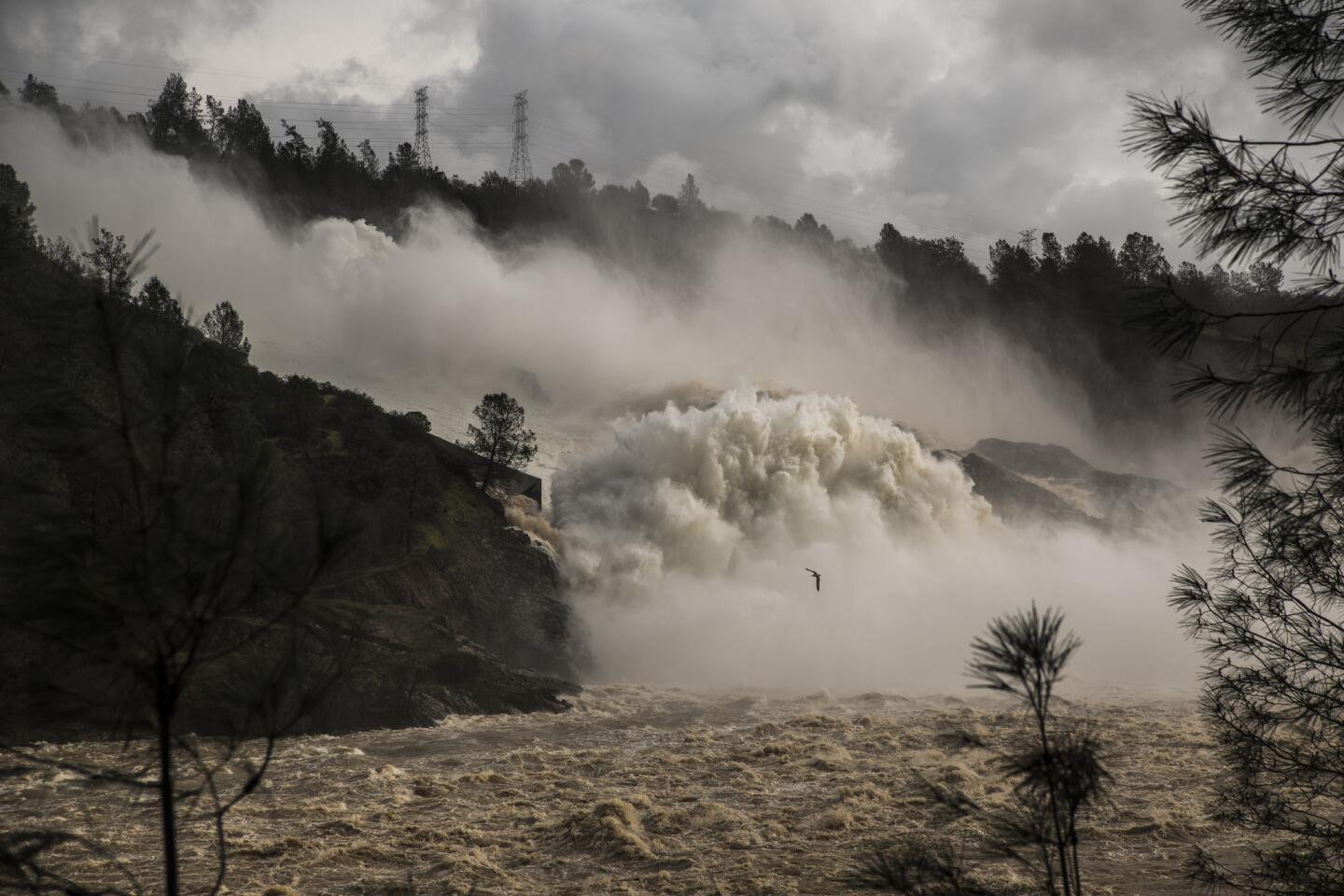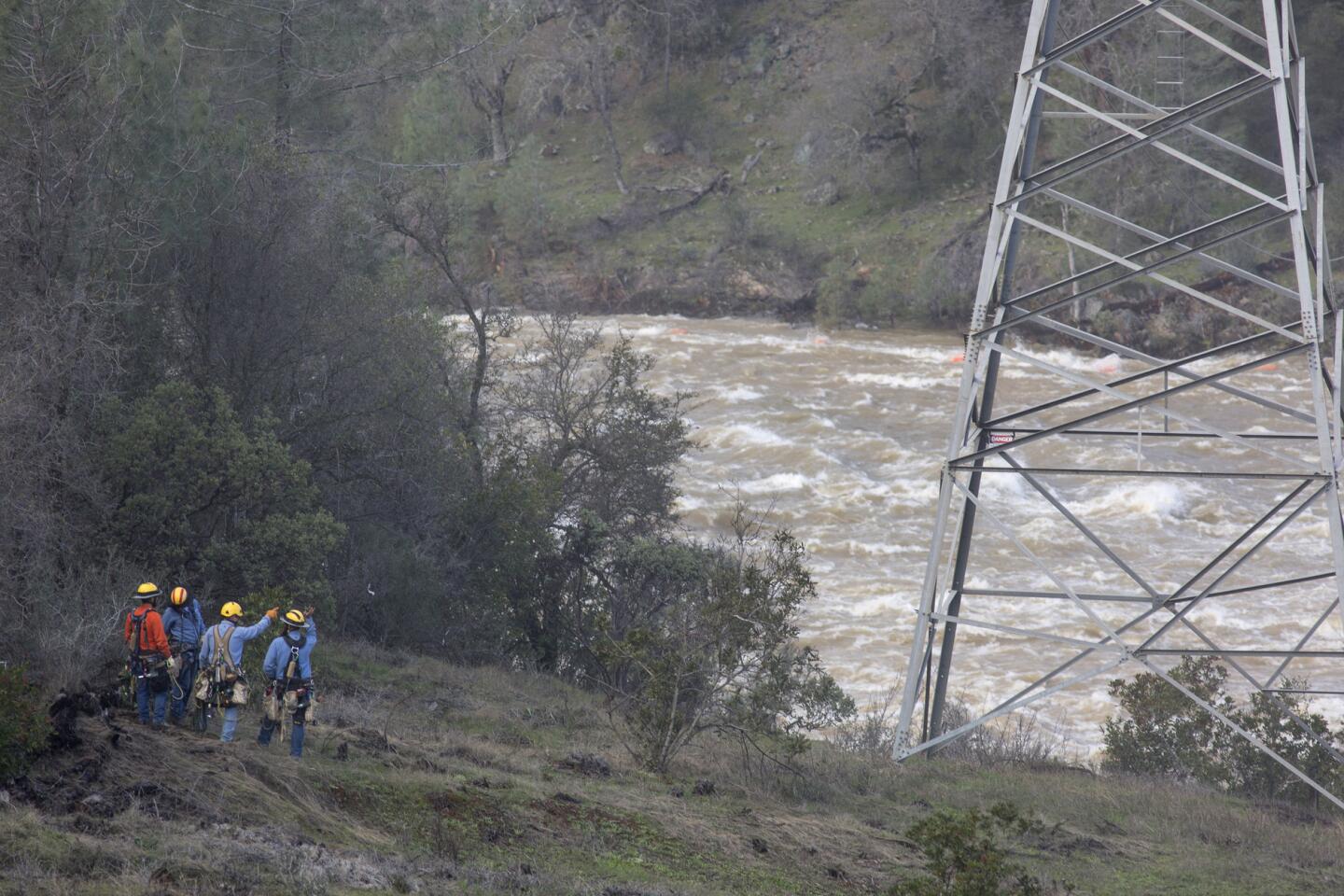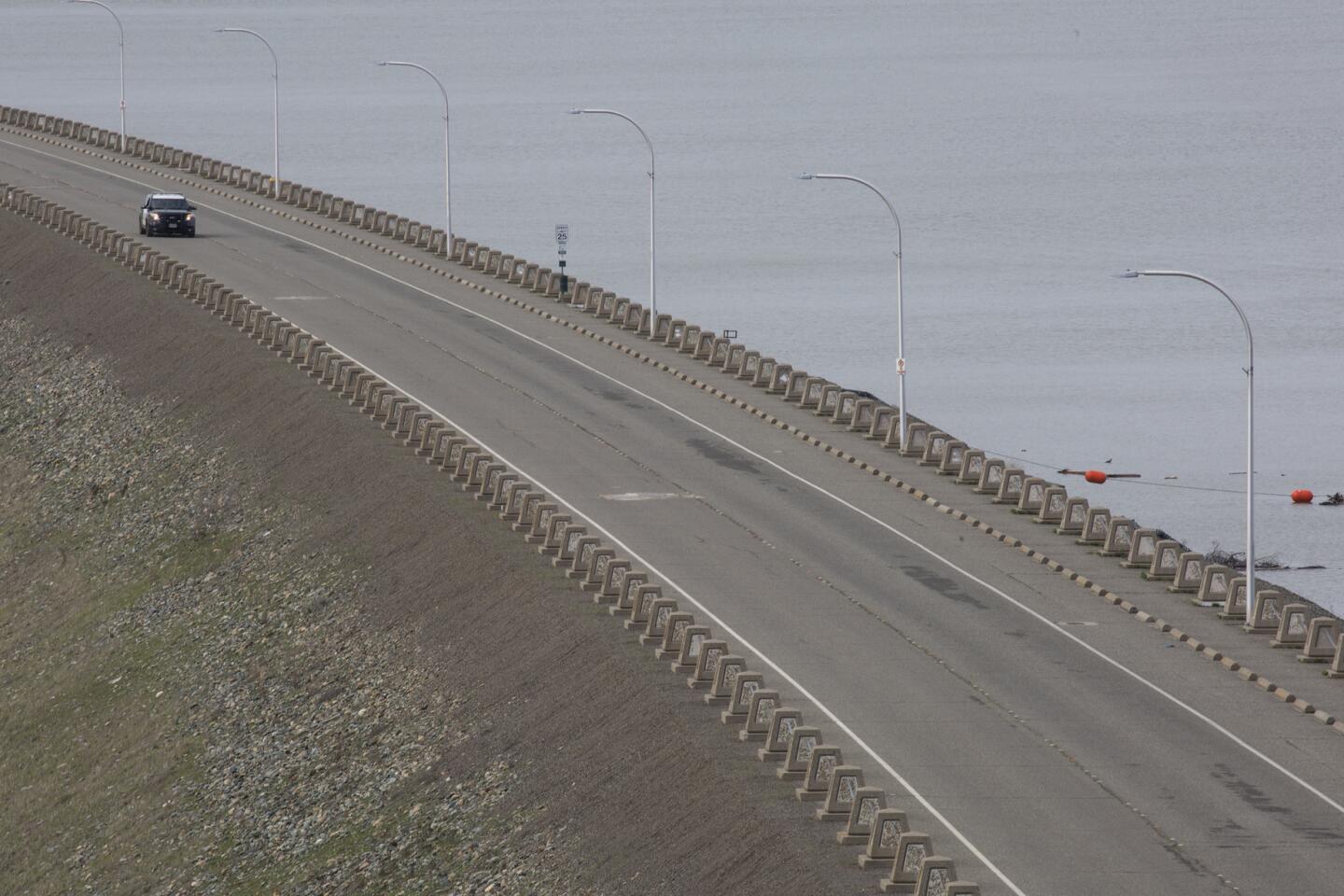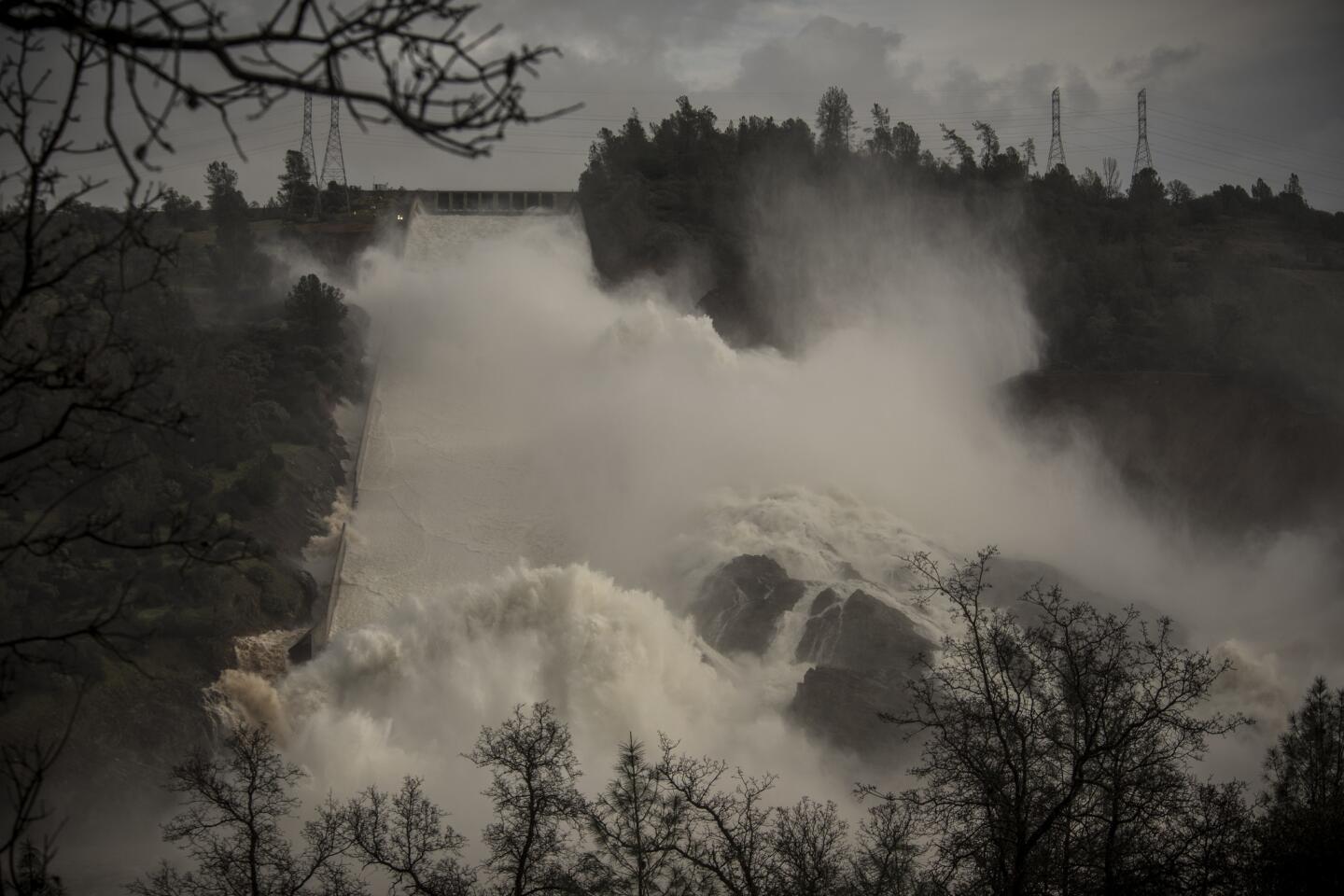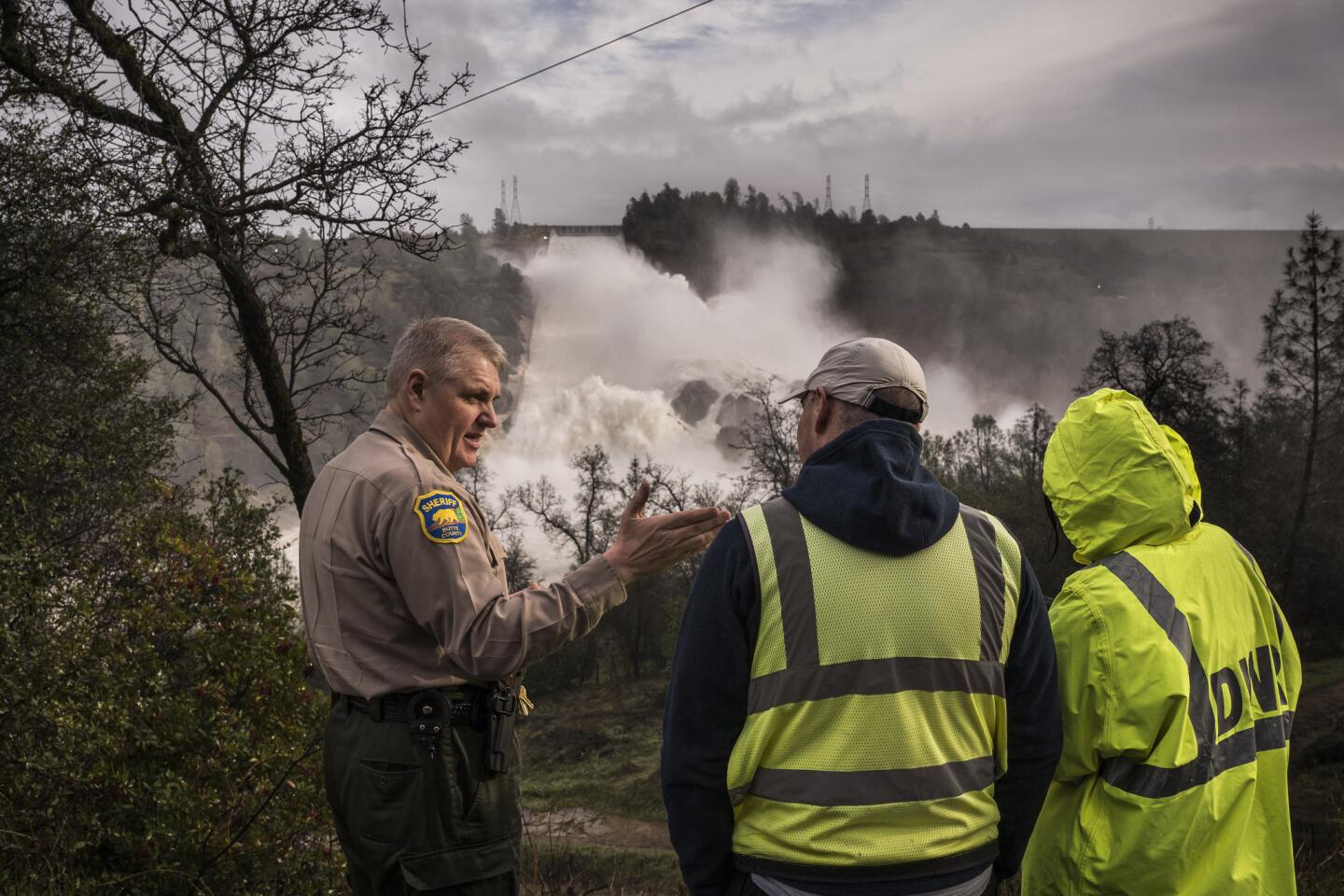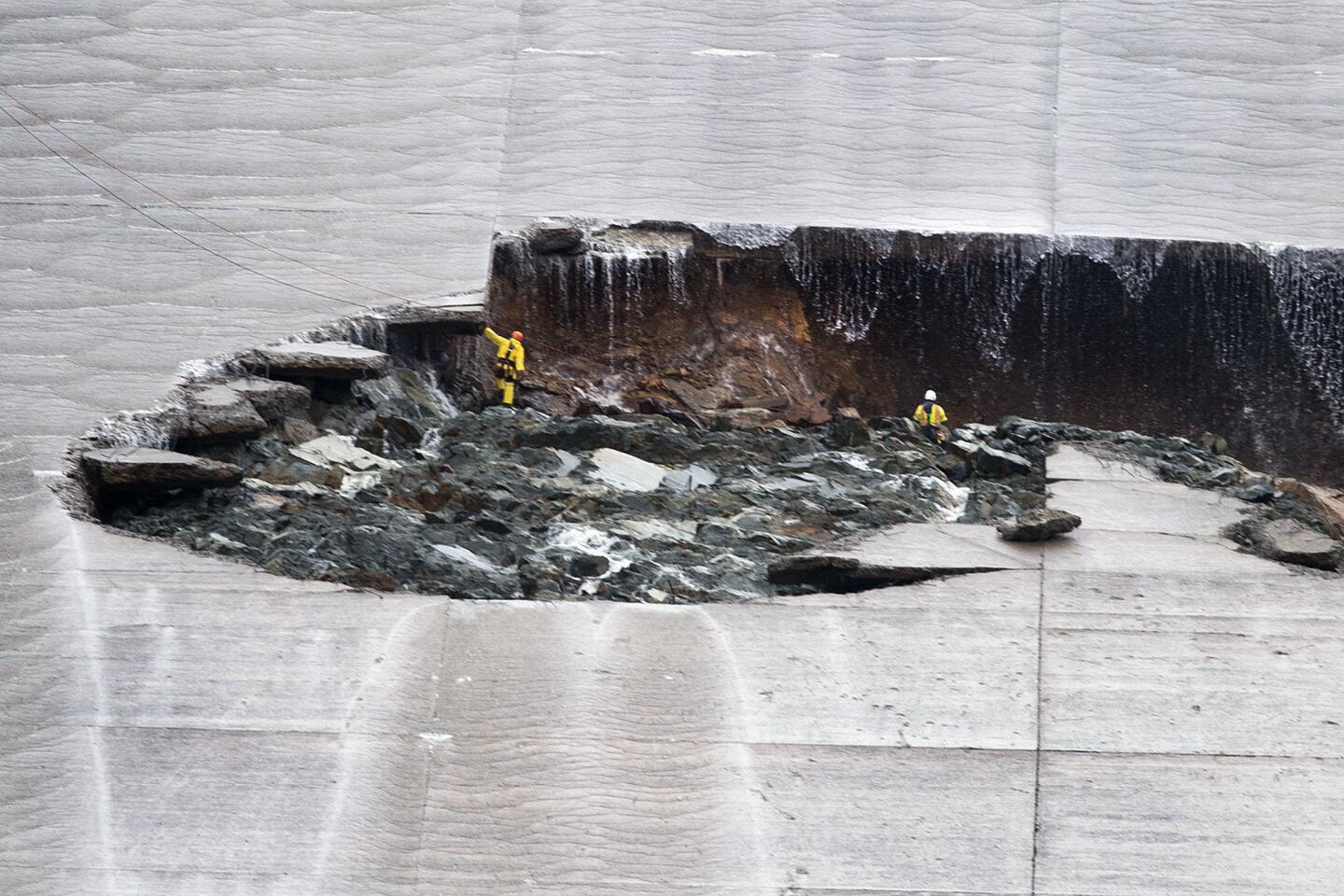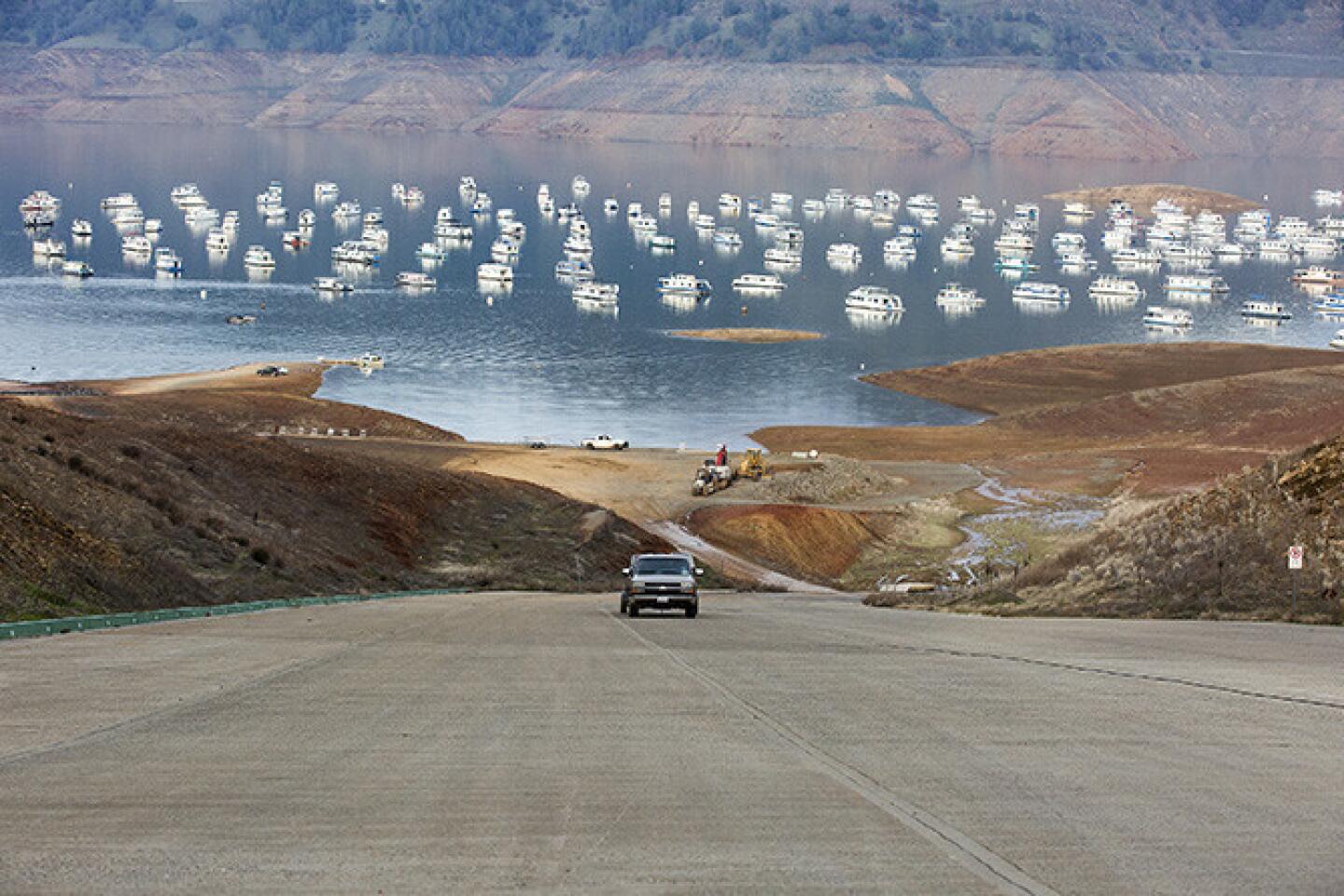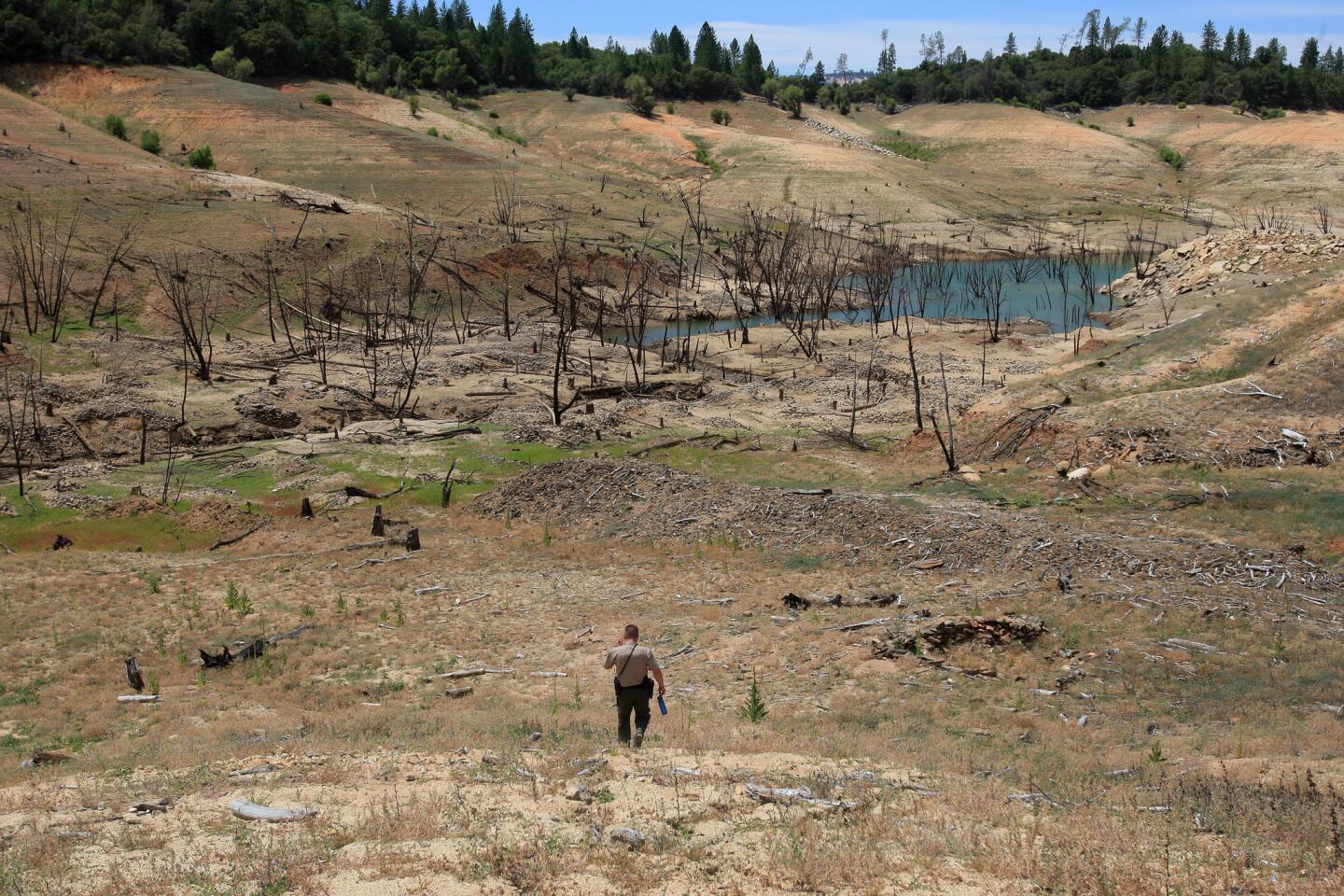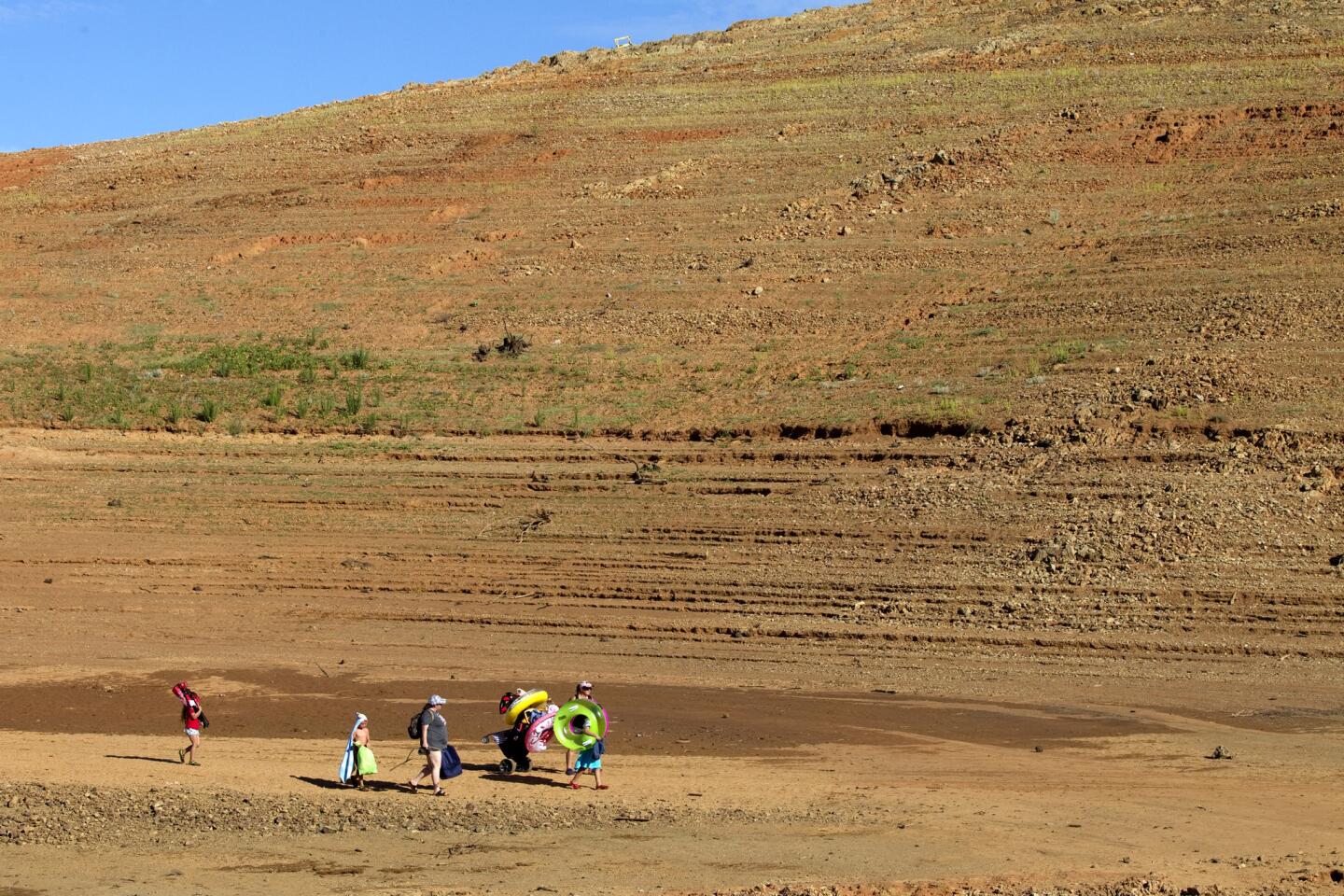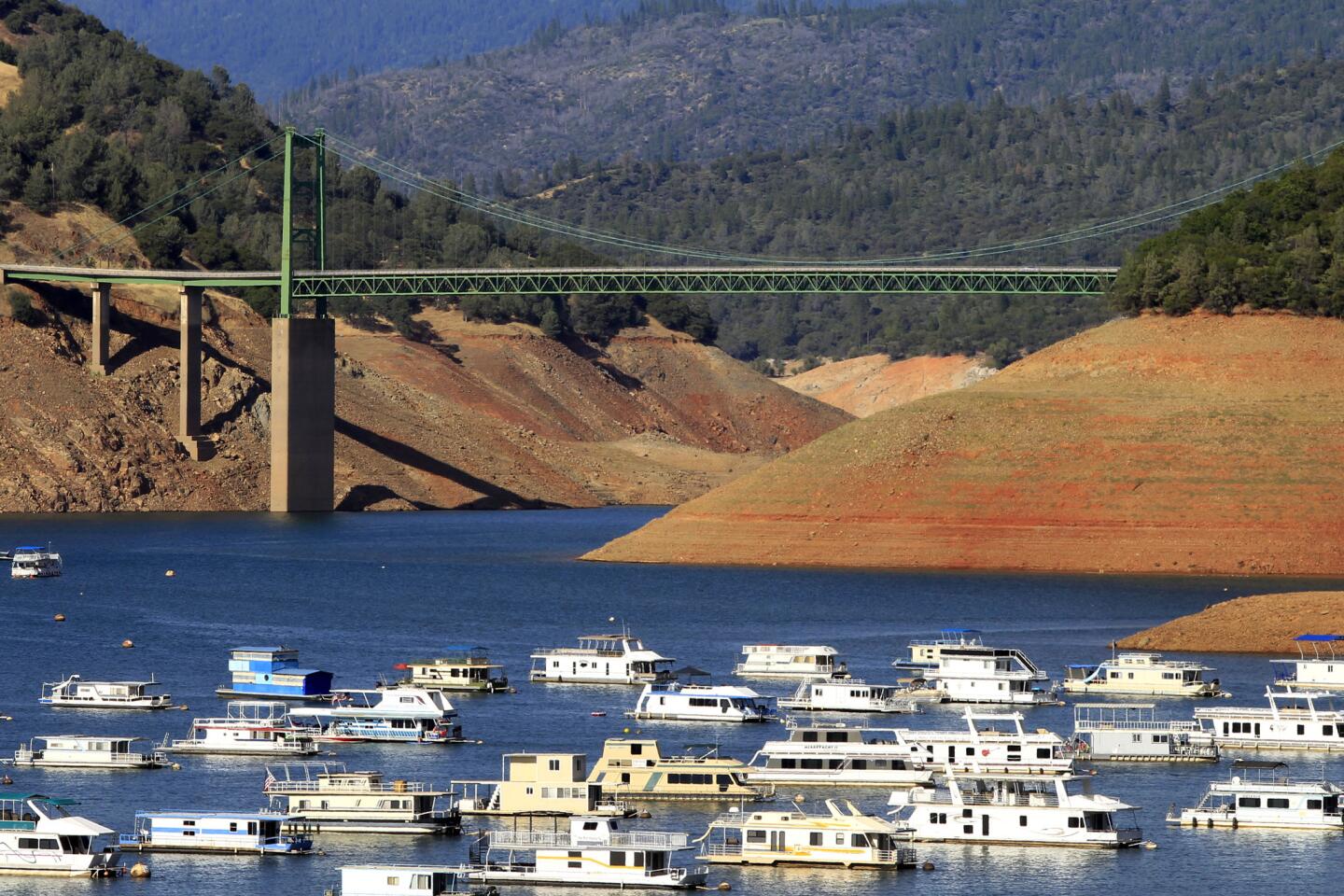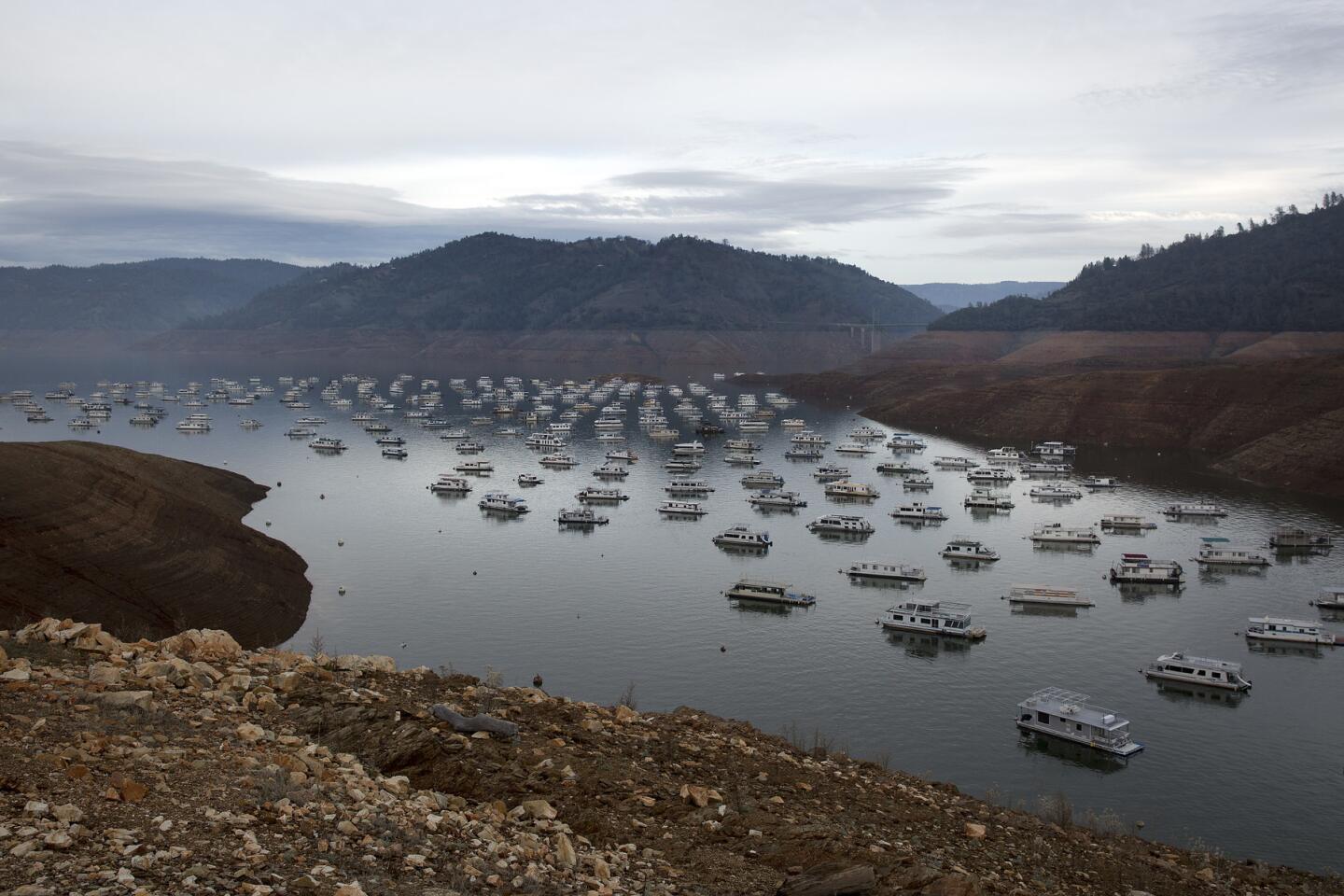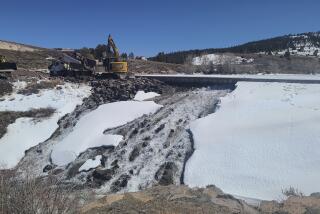Reporting from Oroville, Calif. — Workers are expected on Monday to begin repairing erosion at the emergency spillway at Lake Oroville that threatened to flood downstream towns and forced more than 100,000 people from their homes Sunday.
Officials said they would use bags of rocks to try to plug the hole at the emergency spillway. Preparations were underway Monday morning, with workers gathering supplies for the repair job and trucks bringing in rocks and other materials.
They emphasized the situation remains dangerous at the reservoir and urged residents in communities along the Feather River to evacuate to higher ground.
The flood danger emerged suddenly when a hole developed Sunday in the auxiliary spillway that was being used to lower the levels of the full-to-the brim reservoir, the second-largest in California.
The erosion could undermine the concrete top of the spillway, allowing torrents of water to wash downhill into the Feather River and flood Oroville and other towns in Yuba, Sutter and Butte counties.
Sunday night, officials said the threat had diminished because the lake level had dropped and water was no longer washing over the emergency spillway.
But the situation at Oroville remained precarious. The two main avenues for getting water out of the lake – the unpaved emergency spillway and the main concrete spillway – were both damaged.
Both spillways are separate from Oroville Dam itself, which state officials continued to say was not in danger. The main spillway, a long concrete chute off to the side of the dam, has a gaping gash in it that forced officials to reduce releases last week.
But a new storm system forecast for later this week put water officials on a race against time. Bill Croyle, the acting director of the state Department of Water Resources, said they planned to continue discharging flows at a rate of 100,000 cubic feet per second, with the hope of lowering the reservoir level by 50 feet.
Gov. Jerry Brown late Sunday issued an emergency order aimed at speeding up state aid for the Oroville efforts.
“I’ve been in close contact with emergency personnel managing the situation in Oroville throughout the weekend and it’s clear the circumstances are complex and rapidly changing,” Brown said in a statement. “I want to thank local and state law enforcement for leading evacuation efforts and doing their part to keep residents safe. The state is directing all necessary personnel and resources to deal with this very serious situation.”
Earlier in the day, Butte County Sheriff Kory L. Honea said that the hole was developing near the lower edge of the emergency spillway and eroding “at a rather significant rate.”
“There was significant concern that [the hole] would compromise the integrity of the spillway, resulting in a substantial release of water,” Honea said. “We had to make a very critical and difficult decision to initiate the evacuation of the Oroville area.”
Those in Oroville, a city of about 16,000 people, were asked to flee northward toward Chico, along with Gridley and Biggs. In Yuba County, those in Marysville and other communities in the county’s valley floor were urged to take routes to the east, south or west. In Sutter County, evacuations were ordered for Yuba City, Live Oak, Nicolaus and all communities around the Feather River basin.
“This is not a drill. This is not a drill. Repeat, this is not a drill,” proclaimed a Sheriff’s Department statement posted on social media. Authorities urged residents to contact neighbors and family members and reach out to the elderly and assist them in evacuating.
To slow the erosion on the emergency spillway, state Department of Water Resources officials doubled the flow of water down the main spillway to 100,000 cubic feet per second. The rapid increase drastically reduced the water coming over the emergency spillway.
The dam itself is structurally sound, officials said.
1/66
An aerial view of the water flowing out of the Oroville Dam main spillway, in Oroville, Calif., on Tuesday, February 21, 2017.
(Marcus Yam / Los Angeles Times) 2/66
An aerial view of the water flowing out of the Oroville Dam’s main spillway on Feb. 21. (Marcus Yam / Los Angeles Times)
3/66
Reduced water releases at the Oroville Dam have made damage to its main spillway more visible. (Marcus Yam / Los Angeles Times)
4/66
With a reduced flow on Sunday, most of the water being released from the Oroville Dam is not going down the spillway; it has broken through and is flowing down the hillside. (Marcus Yam / Los Angeles Times)
5/66
With a reduced flow on Sunday, most of the water being released from the Oroville Dam is not going down the spillway, it’s broken through and is going down the hillside.
(Marcus Yam / Los Angeles Times) 6/66
With a reduced flow on Sunday, most of the water being released from the Oroville Dam is not going down the spillway, it’s broken through and is going down the hillside.
(Marcus Yam / Los Angeles Times) 7/66
Juan Alvarez reassures his girlfriend, Sarah Hendrix, after helping her move out of her home in rural Maxwell. Water was a foot high and crews had to evacuate 100 people because of flooding-- some by boat.
(Marcus Yam / Los Angeles Times) 8/66
Ron Chambers lets Duke out of his crate for the first time in hours since the flooding began n Maxwell, Calif. on Saturday.
(Marcus Yam / Los Angeles Times) 9/66
Kevin Anfinson and other volunteers help shovel the muddy sediment that has built up in the salmon raceway at the Feather River Fish Hatchery in Oroville, Calif. (Marcus Yam / Los Angeles Times)
10/66
Fernando Martinez and his mother, not pictured, wade through a road in Gridley, Calif., flooded by the Feather River as it continues to swell from the water being let out of Lake Oroville.
(Marcus Yam / Los Angeles Times) 11/66
A man in a 4x4 truck turns around on Gridley Road after having second thoughts about making it across the flooded road, which had been closed.
(Brian van der Brug / Los Angeles Times) 12/66
Randy Boheim packs up his tools and emergency supplies in anticipation of having to evacuate his whole family as floodwaters creep closer to his home in an Oroville, Calif., mobile home park. The nearby Feather River continued to swell from the water being let out of Lake Oroville ahead of this weekend’s storm.
(Marcus Yam / Los Angeles Times) 13/66
A plantation in Oroville, Calif., sits in floodwaters as the Feather River continues to swell from the water being let out of Lake Oroville ahead of this weekend’s storm.
(Marcus Yam / Los Angeles Times) 14/66
Helicopters ferry sand and rocks to the Oroville Dam’s emergency spillway reconstruction project in Oroville, Calif., ahead of coming rains.
(Brian van der Brug / Los Angeles Times) 15/66
California Water Service district manager Toni Ruggle surveys the Feather River at Bedrock Park downstream from the Oroville Dam.
(Brian van der Brug / Los Angeles Times) 16/66
McKenna Harvey, 9, left, Kylie Atteberry, 11, and Brooklyn Atteberry, 7, hold signs thanking workers in the repair effort at the Oroville Dam.
(Brian van der Brug / Los Angeles Times) 17/66
A helicopter flies over as water flows from the main spillway at Lake Oroville. (Marcus Yam / Los Angeles Times)
18/66
Reconstruction continues in a race to shore up the emergency spillway at Oroville Dam. (Brian van der Brug / Los Angeles Times)
19/66
As rain clouds gather, friends from left, Johnny Eroh, Cody Balmer, Kristien Bravo and Jerel Bruhn hang out by the flooded Feather river in the Bedrock neighborhood of Oroville, Calif., last week. (Marcus Yam / Los Angeles Times)
20/66
Evacuees at the Bangor Community Hall in Bangor, Calif., listen to Butte County sheriff’s deputies in February as the mandatory evacuation order was lifted. An evacuation advisory was lifted Wednesday. (Brian van der Brug / Los Angeles Times)
21/66
Evacuees at the Bangor Community Hall get the news from Butte County sheriff’s Deputy Jeff Heath that the evacuation order has been lifted.
(Brian van der Brug / Los Angeles Times) 22/66
Evacuee Sharon Dalton, right, hugs Raiden Ellis, 10 months, and Chris Ellis as they say their goodbyes as she leaves the Bangor Community Hall in Bangor, Calif., on Tuesday.
(Brian van der Brug / Los Angeles Times) 23/66
David McGlamery returns to his Oroville home with his belongings after the evacuation order was lifted. The family had to retreat to Chico, where they initially stayed at a Walmart parking lot with other evacuees. (Marcus Yam / Los Angeles Times)
24/66
Bill Tirey helps family members move back into their home in the Bedrock neighborhood of Oroville near the Feather River after evacuation orders were lifted.
(Marcus Yam / Los Angeles Times) 25/66
Maria Alancar returns home to greets her pet pig Bacon, who was left behind when the family moved to higher ground in Honcut, Calif.
(Brian van der Brug / Los Angeles Times) 26/66
Sulet Lopez, 21, left, Melissa Mendoza, 3, and Yeanet Lopez, 18, pack up their car at the Bangor Community Hall in Bangor, Calif., to head home after the evacuation order was lifted.
(Brian van der Brug / Los Angeles Times) 27/66
Erica Stenholm, left, Ronnie Vaughan, and Brooklyn Jackson, 7, unpack their car upon returning home after the evacuation order had been lifted in Oroville.
(Marcus Yam / Los Angeles Times) 28/66
Jonah Avina, left, and his wife, Eileen, pray before lunch at the Maranatha Mennonite Fellowship in Bangor, Calif., on Tuesday. The Bangor-area Mennonites are hosting several immigrant families evacuated from the nearby town of Honcut.
(Brian van der Brug / Los Angeles Times) 29/66
Evacuee Estafani Reynoso, left, colors with Mennonite children at the Maranatha Mennonite Fellowship in Bangor, Calif.
(Brian van der Brug / Los Angeles Times) 30/66
Crews work on a damaged section of the emergency spillway at Lake Oroville on Monday. (Josh Edelson / AFP/ Getty Images)
31/66
An Oroville property is flooded on Monday as thousands were under evactuation orders.
(Josh Edelson / AFP/Getty Images) 32/66
The Marysville cemetery underwater along the Feather River.
(Marcus Yam / Los Angeles Times) 33/66
Nirmal Singh, a Sikh priest, conducts a morning prayer ritual as evacuees sleep in the background at the Shri Guru Ravidass, a Sikh temple that has opened its doors for evacuees of the Oroville Dam crisis in Rio Linda, Calif.
(Marcus Yam / Los Angeles Times) 34/66
Kamlesh Nahar, far left, talks to fellow evacuees at the Shri Guru Ravidass Temple.
(Marcus Yam / Los Angeles Times) 35/66
Maria Lopez reads on her smartphone as she spends a second night in her father’s car in the parking lot of the Bangor Community Hall.
(Brian van der Brug / Los Angeles Times) 36/66
Sharon Dalton finds a quiet spot under a table as she spends a second night with her dog Cruiser inside the Bangor Community Hall.
(Brian van der Brug / Los Angeles Times) 37/66
Verna Chadwick and 10-month-old son Raiden Ellis during a second night in the Bangor Community Hall.
(Brian van der Brug / Los Angeles Times) 38/66
The emergency spillway, left, and the damaged main spillway at Lake Oroville are seen in an aerial photo Monday.
(Elijah Nouvelage / Getty Images) 39/66
A dump truck crosses the primary spillway to deliver boulders to the damaged emergency spillway at Lake Oroville on Monday evening.
(Brian van der Brug / Los Angeles Times) 40/66
Helicopters place large rocks on the damaged emergency spillway at Lake Oroville on Monday evening.
(Brian van der Brug / Los Angeles Times) 41/66
Around-the-clock monitoring continues on the damaged primary spillway at Lake Oroville on Monday evening.
(Brian van der Brug / Los Angeles Times) 42/66
Water rushes down a spillway at the Oroville Dam. (Brian van der Brug / Los Angeles Times)
43/66
California Department of Fish and Game wardens view the damaged spillway on Monday. (Brian van der Brug / Los Angeles Times)
44/66
Bill O’Kelley, 86, and wife Doris O’Kelley, 84, of Oroville sit near a flagpole Monday at the Silver Dollar Fairgrounds evacuation center in Chico, Calif.
(Brian van der Brug / Los Angeles Times) 45/66
Coua Tha, of Oroville prepares a meal for her family in the parking lot at the Silver Dollar Fairgrounds evacuation center in Chico, Calif.
(Brian van der Brug / Los Angeles Times) 46/66
Desiree Garcia and daughter Kay’lee Pearl Garcia, 3, of Oroville look over donated clothing Monday at the Silver Dollar Fairgrounds evacuation center in Chico, Calif.
(Brian van der Brug / Los Angeles Times) 47/66
Members of Oroville’s Jordan Crossing Mission pray with a volunteer service member Monday at the Silver Dollar Fairgrounds evacuation shelter in Chico, Calif.
(Brian van der Brug / Los Angeles Times) 48/66
The swollen Feather River flows through Oroville, Calif., on Monday.
(Rich Pedroncelli / Associated Press) 49/66
A building is submerged in Riverbend Park as more water is released from Lake Oroville.
(JOSH EDELSON / AFP) 50/66
Siblings Zach Soto, 11, left, and Gabby Soto, 13, keep an eye on the Feather River along a railroad bridge in Oroville, Calif., on Monday. The family decided to stay in Oroville as they live on high ground near downtown.
(Brian van der Brug / Los Angeles Times) 51/66
Water flows down the damaged main spillway of the Oroville Dam at 55,000 cubic feet per second into the Feather River. (Brian van der Brug / Los Angeles Times)
52/66
Water from Lake Oroville flows down the damaged main spillway.
(Brian van der Brug / Los Angeles Times) 53/66
Water from Lake Oroville flows down the emergency spillway of the Oroville Dam toward the Feather River.
(Brian van der Brug / Los Angeles Times) 54/66
Pacific Gas & Electric crews aided by a helicopter removed transmission lines and insulators from towers standing in the bed of the emergency spillway of Lake Oroville.
(Brian van der Brug / Los Angeles Times) 55/66
A rainbow appears over Feather River as water cascades down the damaged spillway at Lake Oroville Dam.
(Brian van der Brug / Los Angeles Times) 56/66
Water cascades down the spillway below Oroville Dam. The water is being released by authorities to avoid flooding at Lake Oroville because of recent heavy rain. (David Butow / For The Times)
57/66
Pacific Gas and Electric Co. crews move two electric transmission line towers on the bank of Feather River as a precaution if the Lake Oroville Dam emergency spillway needs to be used.
(Brian van der Brug / Los Angeles Times) 58/66
A California Highway Patrol cruiser patrols Lake Oroville Dam, which is closed to the public due to the damaged spillway.
(Brian van der Brug / Los Angeles Times) 59/66
Water cascades down the spillway below the Oroville dam. The water is being released by authorities to ease flooding in Lake Oroville because of recent heavy rain.
(David Butow / For the Times) 60/66
Butte Country Sheriff Kory L. Honea speaks with department of water and power workers at an overlook as the observe runoff from the Oroville Dam.
(David Butow / For the Times) 61/66
Water trickles down as workers inspect part of the Lake Oroville spillway failure in Oroville, Calif.
(Randy Pench / Associated Press) 62/66
A boat launch at Bidwell Canyon is still hundreds of yards above the current lake level on Jan. 21, 2016.
(Brian van der Brug / Los Angeles Times) 63/66
California State Park Ranger Bryan Taylor searches for signs of disturbance or theft as California’s severe drought conditions are revealing historic artifacts at Lake Oroville, June 21, 2014.
(Allen J. Schaben / Los Angeles Times) 64/66
Severe drought conditions are evident as a family treks across a long path back to their car at Lake Oroville, June 21, 2014.
(Allen J. Schaben / Los Angeles Times) 65/66
Houseboats are dwarfed by steep banks that show the water level down 160 feet from the high water mark at the Bidwell Bar Suspension Bridge over Lake Oroville on June 21, 2014.
(Allen J. Schaben / Los Angeles Times) 66/66
Houseboats at Bidwell Canyon Marina at Lake Oroville, January 21, 2016.
(Brian van der Brug / Los Angeles Times) The evacuations marked a dramatic turn of events at the Oroville Dam, located about 75 miles north of Sacramento.
For several days, officials have been trying to figure out how to get water out of Lake Oroville after the main spillway was damaged. A massive hole was discovered last week on the main spillway and eventually spread across the full width of the concrete-lined channel.
Saturday marked the first time the emergency spillway was used since the dam was finished in 1968, and until Sunday afternoon it seemed to be working well. But water from rain and snow continued to flow into Lake Oroville at a rapid pace, causing water levels to rise to emergency levels.
Lake Oroville is the linchpin of California’s state water movement system, sending water from the Sierra Nevada south to the farms across the San Joaquin Valley and cities in the Southland.
Video from television helicopters Sunday evening showed water flowing into a parking lot next to the dam, with large flows going down the damaged main spillway and the emergency spillway.
Officials feared a failure of the emergency spillway could cause huge amounts of water to flow into the Feather River, which runs through downtown Oroville, and other waterways. The result could be flooding and levee failures for miles south of the dam, depending on how much water is released.
On Sunday, officials said that although they expected the uncontrolled spill to end, they plan to continue using the concrete spillway to create more storage in the reservoir in anticipation of rainfall later in the week.
“We’re going to continue to flow water down the spillway and lower the lake,” said Eric See, a spokesman for the Department of Water Resources. “You’re going to see the lake dropping over the next several days.”
Officials emphasized that despite the damage to the spillways, the dam itself was not at risk of failing.
“Believe me, in the last several days there have been a lot of eyes on it,” said Bill Croyle, acting director of the water department. “Oroville Dam is not in any way a part of the damage that occurred.”
Officials have estimated it could cost $100 million to $200 million to repair the damage to the spillways and other features.
Live updates on the Oroville Dam »
Times staff writers Megerian and St. John reported from Oroville; Hamilton and Phillips reported from Los Angeles.
[email protected]
Twitter: @annamphillips
[email protected]
Twitter: @MattHjourno
ALSO
‘This is the worst I have seen’: California’s roads are in dire shape, says former Caltrans director
Inside the black bloc militant protest movement as it rises up against Trump
Atop Mt. Wilson, retired engineers keep alive astronomy’s ‘Sistine Chapel’
UPDATES:
8:44 a.m.: This story was updated with more information on preparations for repair work.
7:10 a.m.: This story was updated with news that the repair is expected to begin.
1:25 a.m. Feb. 13: This story was updated with news of Gov. Brown’s action.
11:35 p.m.: This story was updated with new information from the Department of Water Resources.
8:15 p.m.: This story was updated with comments from evacuating residents.
7:50 p.m.: This story was updated with additional background on the flow of water down the spillway and minor editing.
6:55 p.m.: This story was updated with comments from Butte County Sheriff Kory Honea.
6:30 p.m.: This story was updated with additional details and minor editing.
5:30 p.m.: This article was updated with additional details on the evacuation orders.
4:55 p.m.: This article was updated with news of emergency evacuations.
This article was originally published at 1:50 p.m Feb. 12.

